- Home
- Ann M. Martin
BSC in the USA Page 3
BSC in the USA Read online
Page 3
I quietly began taking out silverware to set the table. I tried to piece together the thoughts tumbling in my mind.
I decided Grandma was right about another thing. Racism is like a disease. Even if you don’t have it, it’s still around in the air. And sometimes it affects the way you see things.
Whether you want it to or not.
Right about then, I started to feel nervous about what I’d find in Dalton….
“ ‘The last Indian to win the Cy Young Award for pitching,’ ” read Kristy from a pamphlet, “ ‘was Gaylord Perry, in 1972.’ ”
“Gaylord Perry doesn’t sound like an Indian name,” I remarked.
Kristy rolled her eyes. “Cleveland Indian.”
“I knew that,” I lied.
As we walked closer to Jacobs Field, a huge cheer rang out.
“Touchdown! The crowd goes wild!” Claudia called out.
Jeff groaned. “There are no touchdowns in baseball.”
I gave Claudia a Look. So did Mary Anne and Dawn. We all cracked up.
Claudia’s my best friend. She and Mary Anne may be the only people in the world who care less about baseball than I do.
Kristy insists it’s a fun sport. Maybe she means playing it. But sitting around in the hot sun and watching grown men in ugly jumpsuits chase a little white ball? Not my idea of a good time.
Now, basketball I don’t mind. It’s faster, for one thing. And the players look great in those shorts.
Okay, maybe I’m still a little biased. I used to go out with a guy named Robert Brewster, who was on the Stoneybrook Middle School basketball team. In fact, he was my boyfriend when I met Ethan Carroll.
Nowadays I don’t think much about basketball. (No, Ethan didn’t break us up. Robert and I were already on the rocks.)
My mom says Ethan and I have an epistolary romance. I thought that had something to do with guns. But she explained it means a romance carried on through letters.
I don’t know if I’d use the word romance. Yet.
Ethan and I have met only once, in New York City. He lives there. He’s fifteen and absolutely, totally gorgeous — almost-black hair, blue eyes, broad shoulders, and cheekbones for days. Talented, too. His big goal in life is to become an artist. In fact, for the month of July, he was touring West Coast art galleries with his parents. (Mr. and Mrs. Carroll must be pretty cool, too.)
Which is why I was going to meet him in Seattle at the Corner Coffee Shop. Why that particular spot? Ethan is staying nearby, in his relatives’ apartment. Besides, we New Yorkers love coffee shops. (“Coffee shop” is New Yorkese for “diner.” Don’t ask me why.)
Since we’d met, Ethan and I had been calling and writing. Mostly writing. I couldn’t wait to see him in person again.
I was scared, too, to be honest. I mean, we were still newlymets. What if I’d been wrong about him? What if he had some secret terrible quality, like picking his nose in public or a passion for baseball?
I guess I’d just have to take my chances.
“Get your Indians souvenirs here!” shouted a potbellied guy from a stand near the ballpark.
Kristy was already making a beeline.
WHONNK-WHONNK-WHONNK-WHONNK! whonked an organ from inside the ballpark.
“Can’t we go in?” Jeff asked his dad excitedly. “Please please please please?”
Puh-leeze.
“You can’t just walk in, right in the middle of the game!” I exclaimed.
Mr. Schafer laughed. “Sure you can.”
“Maybe I’m thinking of the theater,” I murmured.
Kristy was walking back toward us, an Indians cap on her head and a huge smile on her face. “Got one!”
“We’re going to the game!” Jeff announced.
“Whaat?” Claudia, Mary Anne, Dawn, and I said together.
“Yyyyyesss!” Kristy sprinted toward the ticket booth.
“But — but?—” I sputtered.
“It’s four against three, Dad,” Dawn jumped in.
Then Mr. Schafer said the words I dreaded to hear. “I think it would be fun.”
Off we trudged. Like prisoners to the dungeon.
What was the game like? Well, we stood up and cheered one home run, but we booed another. We participated in two waves. We ate hot dogs that tasted as if they’d been cooking since February. A foul ball whizzed into the stands nearby. Afterward, Claudia ducked each time she heard the crack of a bat. I managed to read an entire Cleveland travel guide, ads included, by the time the game ended.
That, as it turned out, saved the whole day. I showed Mr. Schafer the travel guide, and he went nuts over one particular place.
We were going to have our first official side trip …
“I want to go to the ice-cream shop!” Andrew cried out.
“Me, too!” Abby exclaimed.
“Maybe it won’t be so boring, after all,” David Michael murmured.
“Seeing wild ponies on the beach is not boring!” Jessi remarked.
“Where are they?” Karen asked.
David Michael made a face. “There are no ponies here. No beach, either.”
I was looking out the RV window. We were driving along Main Street of Chincoteague Island. Slowly. Traffic was bumper-to-bumper. I saw souvenir shops, restaurants, clothing stores, motels, boating supply stores, and jewelry shops. Tourists crowded the sidewalks. A storefront advertised a display of the original Misty, preserved.
“Misty is stuffed?” Jessi murmured.
The idea made me sick.
“Well … this is a nice place,” Watson remarked.
“Quaint,” Mrs. Brewer added.
Honk! Honk! blared a bus in front of us, spewing exhaust.
This wasn’t at all what I was expecting. This wasn’t the Chincoteague Island I’d read about. Chincoteague was a little village where kids ran around barefoot in the streets and old folks swapped stories on the front porch. At least it was in all the Marguerite Henry books.
Have you read them? You should, even if you’re not a horse fan like me. The stories are great — especially the legend of the wild ponies.
You see, back in the 1500s, a cargo of stallions escaped from a shipwrecked Spanish galleon, swam to a nearby island, and made it their home. You can still see their descendants today, running wild and free. (Historians say there’s no proof of this, but I believe it.)
The ponies are actually on nearby Assateague Island, which is almost forty miles long. Chincoteague is tucked snugly between it and the mainland. Every year in late July, the wild ponies are rounded up and made to swim the inlet to Chincoteague. They’re auctioned to the public. The ones who aren’t bought are allowed to swim home.
We were arriving too early for the roundup. Still, I had been dying to see the ponies for myself.
Now, seeing Chincoteague, I was just dying.
I opened my copy of Misty of Chincoteague and checked the copyright date.
It read 1947.
“Wow,” I murmured. “These books are old.”
Jessi nodded. “I guess places change.”
Before I could answer, I heard a sudden, loud thud. We all lurched forward.
“What was that?” Abby asked.
Andrew burst into tears. “Did we crash?”
“We were hit,” Watson said. He glanced impatiently into the rearview mirror. “Hang on, I’m going to pull over and check the damage.”
He steered into a nearby parking lot and edged into a space. The car that had hit us parked in the next space. An older couple and a girl about my age climbed out.
“I am so sorry,” the man said to Watson. “Completely my fault.”
“My granddad is an excellent driver,” the girl announced. “You stopped very abruptly.”
“We did not!” Karen protested.
“Now, now,” Watson said with a chuckle. “This is a matter for the drivers to settle.”
“I’m Saville Hoyer,” the man said, extending his hand to Watson. “This is my wife, Judy,
and our granddaughter, Felicitas.”
Felicitas made a sour face. “Nobody calls me that. It’s Liz.”
“We are taking her on a trip to the West Coast,” Mrs. Hoyer said. “We are so happy her parents agreed to let her go….”
The grown-ups started walking around to look at the damage, and all us kids followed. The RV’s bumper was dented pretty deeply in the middle.
“Uh-oh,” Abby muttered. “What is Watson going to tell the rental place?”
“You could say a wild pony kicked it,” Liz suggested. “Wild ponies can be unpredictable.”
All the grown-ups laughed, as if that were the cutest thing ever said. Then they started yakking about insurance.
“What have you seen so far?” Liz abruptly asked. “On Chincoteague.”
“Well, we just drove in?—” I began.
“So far we’ve seen a snowy egret, a glossy ibis, an osprey, and a Northern bobwhite,” Liz barreled on. “You must have seen one of those.”
“Uh …” said Abby.
“Nahhh, just a bunch of birds and stuff,” David Michael piped up.
Liz rolled her eyes. “Those are birds. Actually, I came here to see the wild ponies. They’re not on Chincoteague Island, you know.”
I nodded. “I know. They’re on?—”
“Assateague,” Liz said. “Isn’t that the funniest name? Anyway, Marguerite Henry? She’s the writer of the Misty books? Well, she’s wrong about the way the ponies arrived. It wasn’t a shipwreck.”
“Well, no one knows for sure?—” I began.
“The early American settlers? They didn’t have time to build fences, so they used Assateague as a natural pen. You know why? Because it’s an island and the horses couldn’t escape. Anyway, that’s where the wild ponies came from. Actually, they’re feral ponies. That means their ancestors were domesticated but became wild. And do you know why they look fatter than regular ponies? Because they drink salt water, and that retains moisture in their bodies?—”
“All right, Liz! Time to go!” (Saved by the grandmother.)
“‘Bye!” Liz said, skipping away. “And don’t feed the ponies! It can destroy their natural eating habits.”
I looked at Jessi. Her face was twisted into a I’m-trying-not-to-show-how-annoyed-I-really-am expression.
“She’s either a genius or a robot,” David Michael announced.
I cracked up. So did Jessi and Abby. We all climbed back into the RV.
“What a pest!” Jessi said.
“We could hire her as a travel guide,” Abby suggested.
I kept my mouth shut. I didn’t want to talk about Liz behind her back.
But I could think whatever I wanted. And I sure was glad we didn’t have to travel with her.
When we finally started off again, the traffic was moving a little faster. Soon the tourist shops and motels thinned out and disappeared. We were driving over a causeway toward Assateague.
Now this was more like it. Assateague was foggy, covered with low pine trees, scrubby plants and grasses, and distant ponds. I reached into my backpack and took out a pair of binoculars I’d brought along. Jessi was already looking through hers. “Do you see anything yet?”
“Just a glossy ibis,” Jessi replied. “Or maybe it’s a snowy bobwhite.”
I raised my binoculars and gazed through them.
A half hour later I was still gazing. My eyes were dry and tired. I’d seen nothing but plants, birds, and water.
“Where did all the horsies go?” Andrew asked.
Abby shrugged. “On a hayride?”
Watson sighed. “We’ve been twice around the Wildlife Loop. They’re supposed to be near here.”
“Can’t we drive farther out on the island?” I asked.
Watson shook his head. “You need a special permit.”
My heart was sinking.
“I’m hungry!” Andrew whined.
“Shall we find a place for a picnic?” Mrs. Brewer asked.
“Yeeeaaa!” shouted David Michael, Andrew, and Karen.
Ahead of us was a sign that read WOODLAND TRAIL/HIKERS AND BIKERS ONLY. Watson maneuvered the RV into a small parking area nearby.
“This is a hiking trail, Watson,” Mrs. Brewer said. “The Visitor Center up ahead has picnic facilities.”
“It’ll be crowded,” Watson replied. “Here we can find a nice, open area of our own.”
The Brewers had packed us several hampers full of sandwiches and drinks. I threw my binoculars into my pack and slung it over my shoulders. Then I grabbed a hamper and climbed out.
“Bummer, huh?” Jessi said.
“They must have all swum back to Spain,” I grumbled.
The trail was more crowded than I expected. And buggy. I must have swatted a hundred mosquitoes. We walked and walked until Andrew started whining. Fortunately we were near a clearing that overlooked a marshy area.
“Well, it’s not exactly beachfront,” Mrs. Brewer said with a sigh, pulling out a big blanket.
We settled in and began eating. For a moment, I forgot about the ponies. My stomach was growling with hunger. My chicken salad sandwich tasted great. Even if I did have to share it with ants and yellow jackets.
That was when, out of the corner of my eye, I noticed a distant movement.
Beyond the marsh. Over a sand dune.
I grabbed my binoculars.
It was a brown mare nudging along a tiny colt. They stood there a moment, as if they were talking.
Then they were joined by the most beautiful, barrel-chested chestnut I have ever seen.
And another. And another.
“Oh my lord …” Abby said.
All at once, the ponies began to run down the dune, kicking up sand.
I dropped my sandwich and stood up.
“Go, Misty!” Jessi cried.
“Horsies!” Andrew screamed.
Mrs. Brewer had tears in her eyes. “They’re stunning!”
I didn’t say a word. I couldn’t.
The sand sprayed up behind them in golden arcs. Their manes were like silky flags, their legs strong and lean.
Exactly the way I’d pictured them.
I just watched until they were out of sight. Until my binoculars were blurry with my own tears.
If the RV were to fall apart, if we had to travel home on a bus, if it rained the rest of the time, it wouldn’t matter.
As far as I was concerned, the trip had already been worth it.
Knock-knock-knock-knock!
“Hurry up! Hurry up! I have to go!”
Jeff’s face was red. He twisted the doorknob of the bathroom in the RV.
“I just got in here!” shouted Dawn’s voice from inside. “Wait!”
“I can’t!”
How many times had I heard this conversation during the ride? About a million.
Let me tell you, a cross-country trip is not for the impatient. Or the claustrophobic.
When we began our trip, the RV seemed like a house on wheels. Beds, a table and chairs, big windows — cool or what? Plus, we had all that free time.
Somewhere outside of Connecticut the house seemed to start shrinking.
I don’t know about you, but I can take just so much of sitting still and doing nothing. At first we played cards, but everyone kept beating me. Then we played twenty questions, but I always needed about fifty. I tried sketching the scenery, but it went by too fast and I started feeling sick to my stomach. I listened to the radio, but Mr. Schafer likes to play all this awful old-fashioned music. So I ate an entire bag of Pepperidge Farm Goldfish to console myself. Then I took a long nap.
And that was all in the first two hours.
Three days later, after stops in Cleveland and Detroit, our house on wheels felt like a rolling shoe box. (Smelled like one, too, except you didn’t really notice that until you left it and came back.)
During the trip, I discovered a lot of unexpected things about my friends. For instance, I had no idea that Kristy likes to wash
her hair with soap to “save time” (I nearly fainted). Or that Jeff eats peanut-butter-and-tuna-fish sandwiches. Or that Dawn’s organic apples sometimes have worms, which I found out the hard way. Or that the sound of Mary Anne’s knitting could drive me absolutely crazy after about two hours.
Tickety-tick-ticka-tickety-tick, went her plastic needles, as Jeff paced the narrow area in front of the bathroom.
When Mary Anne first started knitting, the sound reminded me of soft rain on a cozy night. After awhile, it was like mice skittering on a tile floor.
Now I was thinking about skeleton bones rattling in a grave.
“Uh, Mary Anne?” I began.
Click. The bathroom door swung open.
Jeff dived in practically before Dawn had a chance to escape. He slammed the door behind him.
“He always waits until the last minute,” Dawn grumbled.
“What’s the difference?” Jeff’s voice shouted from inside. “No matter when I want to go, you’re always in there!”
“Chicago, fifty-seven miles!” Mr. Schafer announced.
“Oh, groan,” I groaned. “Another hour.”
“Patience, Claudia,” said Stacey, who was sitting in the seat behind Mr. Schafer, gazing listlessly out the window.
Mary Anne looked up from her knitting. “My dad goes to Chicago a lot for his law firm. He loves it there.”
“Ah, wining and dining away from home on an expense account, eh?” Mr. Schafer said with a chuckle. “Must be nice.”
“He works very hard,” Mary Anne replied. “It’s not really a vacation?—”
“My lawyer friends are all workaholics,” Mr. Schafer said. “They never see their families. That’s one thing I like about my job. Evenings and weekends are mine.”
Tickety-tickticktickticktick! Mary Anne was going double time now. “Actually, my dad spends lots of time with us,” she mumbled.
“I’m sure he does?—”
“Hey, Chicago has a beach!” cried Kristy, looking up from a travel guide. “It’s right in the city!”
“Surf’s up!” Dawn yelled.
Jeff burst out of the bathroom. “Can we go there? I mean, after the ball game?”
“The Cubs are away today,” Kristy informed him. “We’re just going to look at the stadium and buy a cap.”

 Karen's Tea Party
Karen's Tea Party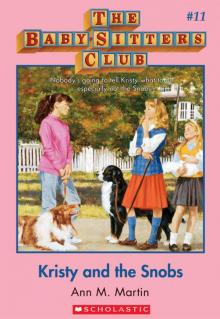 Kristy and the Snobs
Kristy and the Snobs Best Kept Secret
Best Kept Secret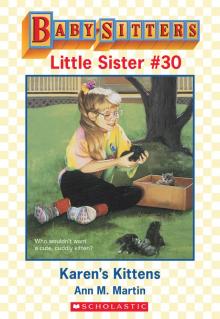 Karen's Kittens
Karen's Kittens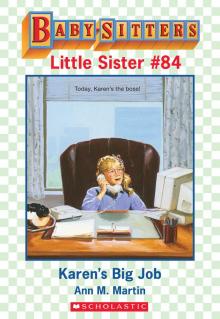 Karen's Big Job
Karen's Big Job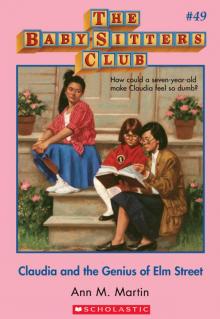 Claudia and the Genius of Elm Street
Claudia and the Genius of Elm Street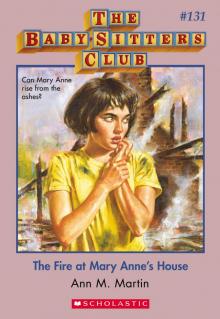 The Fire at Mary Anne's House
The Fire at Mary Anne's House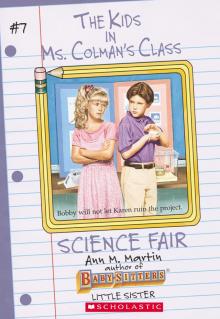 Science Fair
Science Fair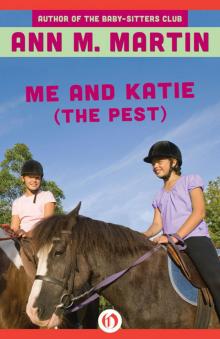 Me and Katie (The Pest)
Me and Katie (The Pest)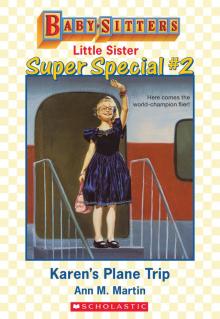 Karen's Plane Trip
Karen's Plane Trip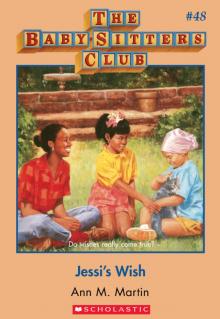 Jessi's Wish
Jessi's Wish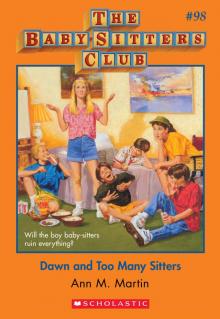 Dawn and Too Many Sitters
Dawn and Too Many Sitters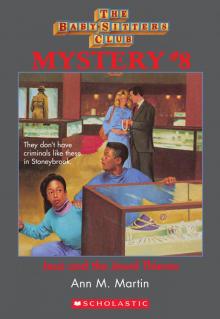 Jessi and the Jewel Thieves
Jessi and the Jewel Thieves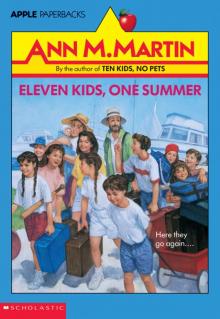 Eleven Kids, One Summer
Eleven Kids, One Summer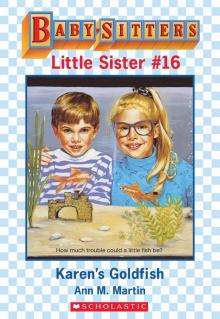 Karen's Goldfish
Karen's Goldfish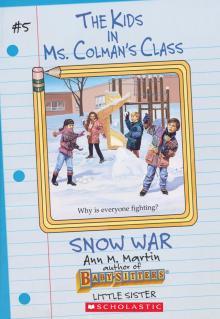 Snow War
Snow War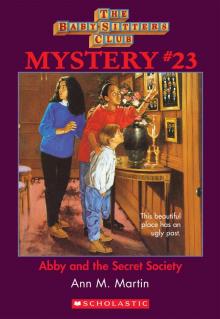 Abby and the Secret Society
Abby and the Secret Society Keeping Secrets
Keeping Secrets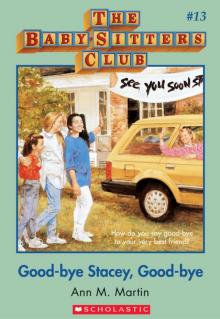 Good-Bye Stacey, Good-Bye
Good-Bye Stacey, Good-Bye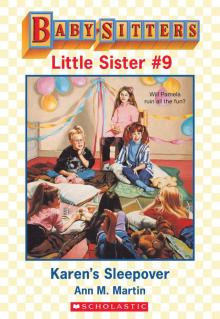 Karen's Sleepover
Karen's Sleepover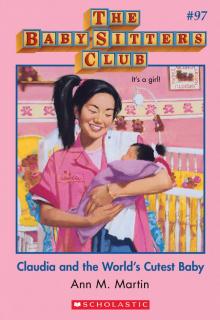 Claudia and the World's Cutest Baby
Claudia and the World's Cutest Baby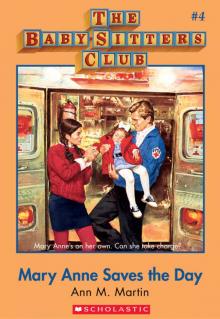 Mary Anne Saves the Day
Mary Anne Saves the Day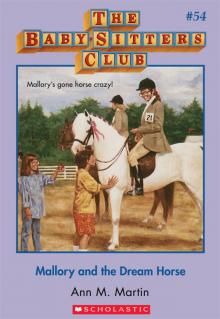 Mallory and the Dream Horse
Mallory and the Dream Horse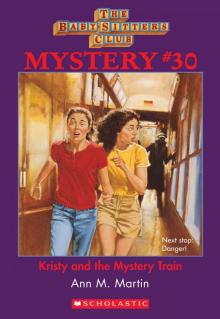 Kristy and the Mystery Train
Kristy and the Mystery Train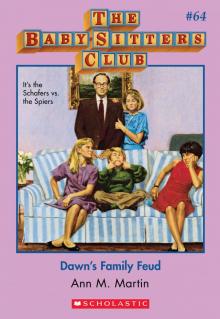 Dawn's Family Feud
Dawn's Family Feud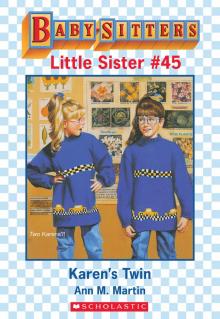 Karen's Twin
Karen's Twin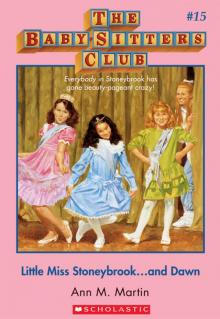 Little Miss Stoneybrook... And Dawn
Little Miss Stoneybrook... And Dawn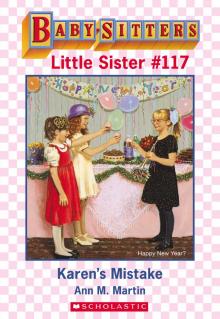 Karen's Mistake
Karen's Mistake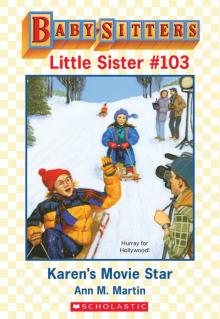 Karen's Movie Star
Karen's Movie Star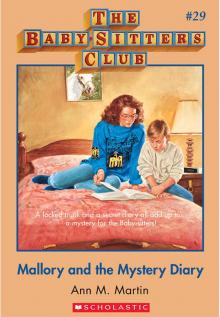 Mallory and the Mystery Diary
Mallory and the Mystery Diary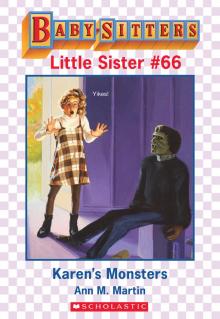 Karen's Monsters
Karen's Monsters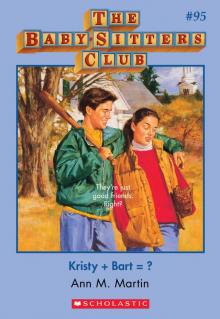 Kristy + Bart = ?
Kristy + Bart = ?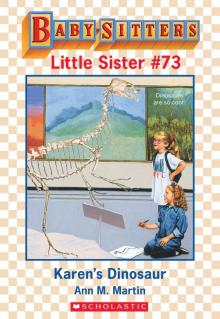 Karen's Dinosaur
Karen's Dinosaur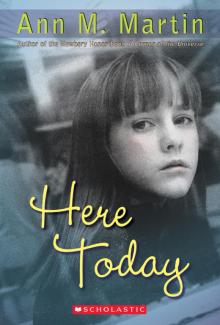 Here Today
Here Today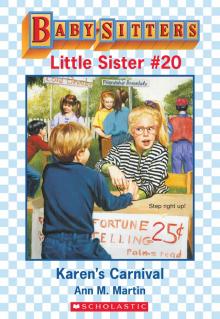 Karen's Carnival
Karen's Carnival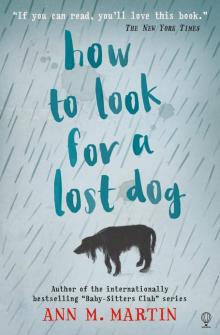 How to Look for a Lost Dog
How to Look for a Lost Dog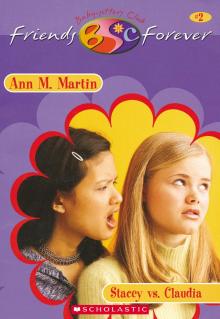 Stacey vs. Claudia
Stacey vs. Claudia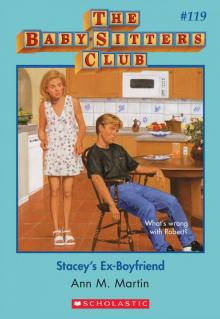 Stacey's Ex-Boyfriend
Stacey's Ex-Boyfriend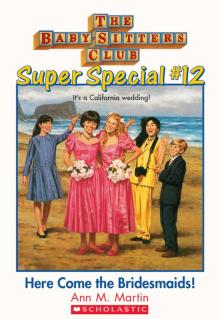 Here Come the Bridesmaids!
Here Come the Bridesmaids! Graduation Day
Graduation Day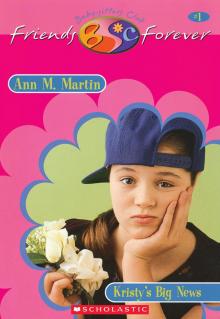 Kristy's Big News
Kristy's Big News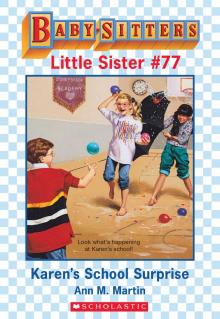 Karen's School Surprise
Karen's School Surprise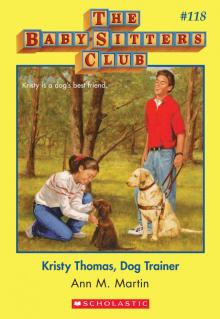 Kristy Thomas, Dog Trainer
Kristy Thomas, Dog Trainer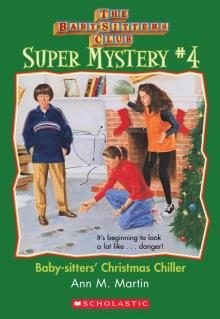 Baby-Sitters' Christmas Chiller
Baby-Sitters' Christmas Chiller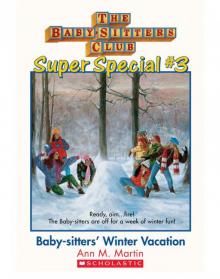 Baby-Sitters' Winter Vacation
Baby-Sitters' Winter Vacation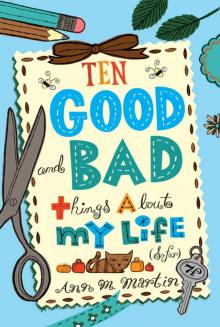 Ten Good and Bad Things About My Life
Ten Good and Bad Things About My Life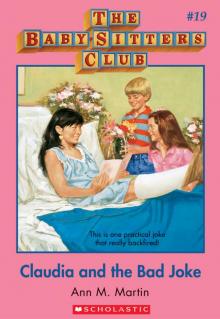 Claudia and the Bad Joke
Claudia and the Bad Joke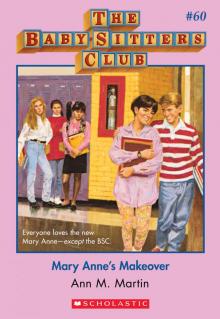 Mary Anne's Makeover
Mary Anne's Makeover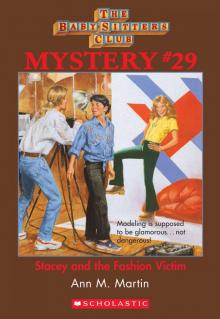 Stacey and the Fashion Victim
Stacey and the Fashion Victim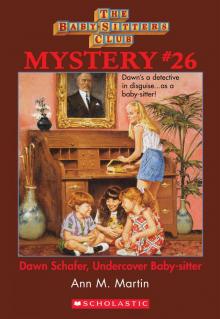 Dawn Schafer, Undercover Baby-Sitter
Dawn Schafer, Undercover Baby-Sitter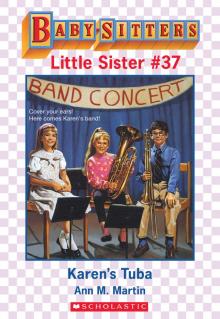 Karen's Tuba
Karen's Tuba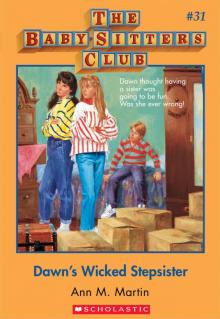 Dawn's Wicked Stepsister
Dawn's Wicked Stepsister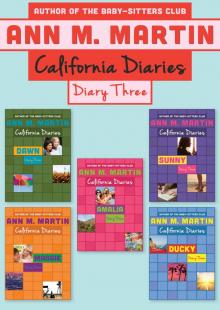 Diary Three: Dawn, Sunny, Maggie, Amalia, and Ducky
Diary Three: Dawn, Sunny, Maggie, Amalia, and Ducky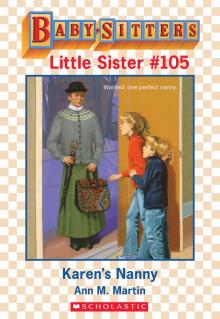 Karen's Nanny
Karen's Nanny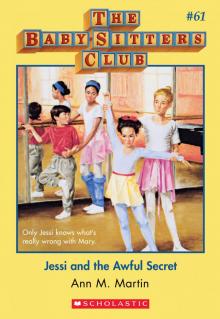 Jessi and the Awful Secret
Jessi and the Awful Secret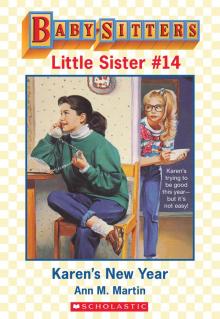 Karen's New Year
Karen's New Year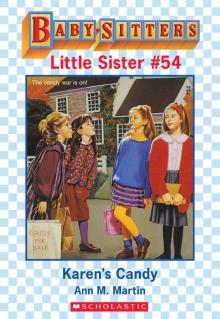 Karen's Candy
Karen's Candy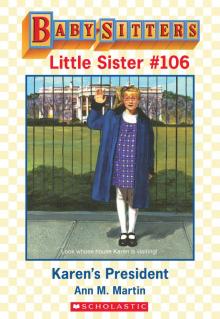 Karen's President
Karen's President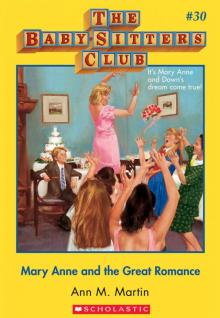 Mary Anne and the Great Romance
Mary Anne and the Great Romance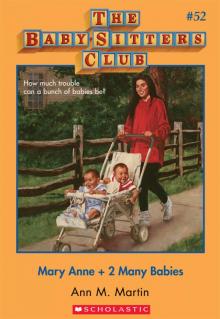 Mary Anne + 2 Many Babies
Mary Anne + 2 Many Babies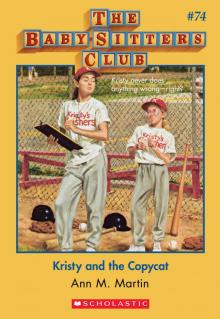 Kristy and the Copycat
Kristy and the Copycat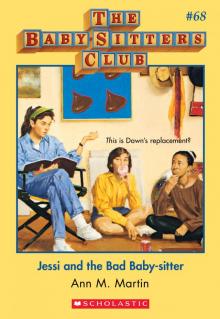 Jessi and the Bad Baby-Sitter
Jessi and the Bad Baby-Sitter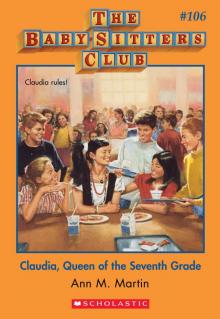 Claudia, Queen of the Seventh Grade
Claudia, Queen of the Seventh Grade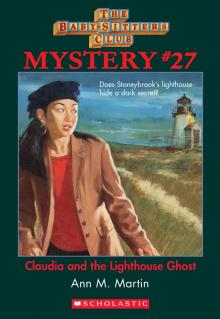 Claudia and the Lighthouse Ghost
Claudia and the Lighthouse Ghost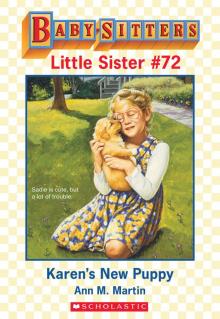 Karen's New Puppy
Karen's New Puppy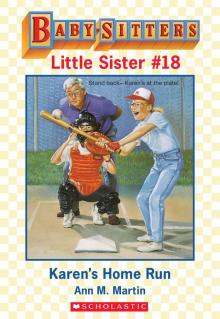 Karen's Home Run
Karen's Home Run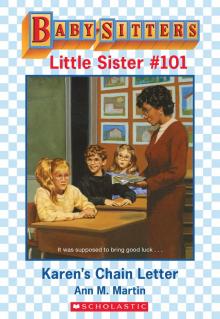 Karen's Chain Letter
Karen's Chain Letter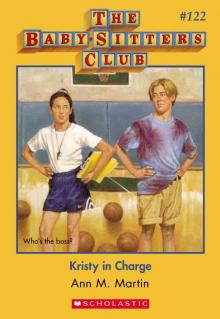 Kristy in Charge
Kristy in Charge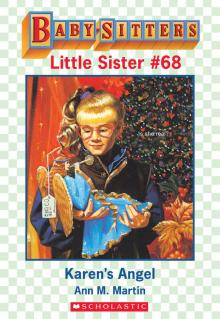 Karen's Angel
Karen's Angel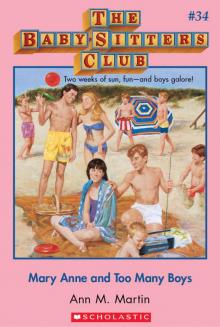 Mary Anne and Too Many Boys
Mary Anne and Too Many Boys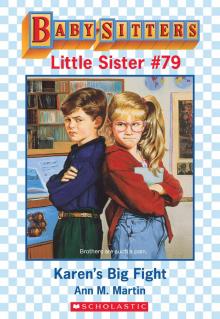 Karen's Big Fight
Karen's Big Fight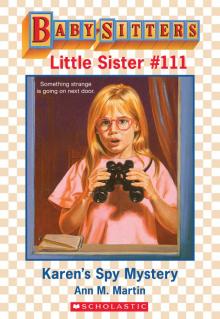 Karen's Spy Mystery
Karen's Spy Mystery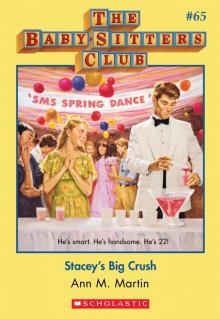 Stacey's Big Crush
Stacey's Big Crush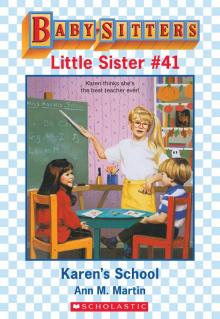 Karen's School
Karen's School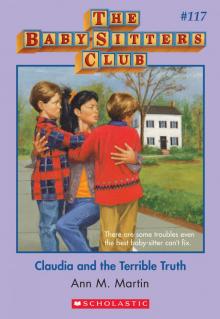 Claudia and the Terrible Truth
Claudia and the Terrible Truth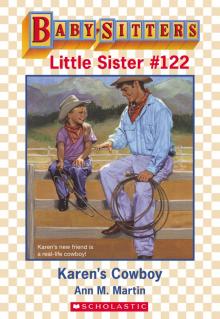 Karen's Cowboy
Karen's Cowboy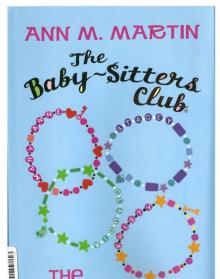 The Summer Before
The Summer Before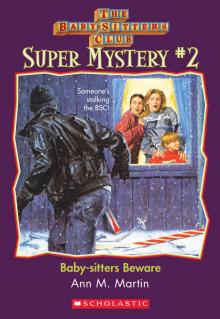 Beware, Dawn!
Beware, Dawn!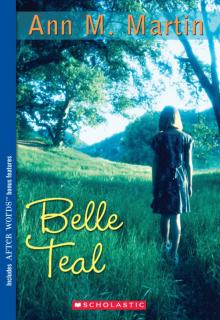 Belle Teale
Belle Teale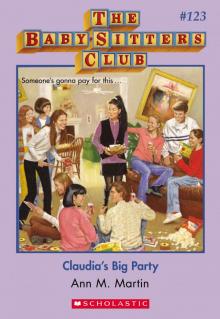 Claudia's Big Party
Claudia's Big Party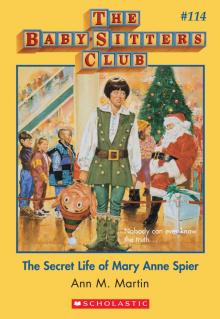 The Secret Life of Mary Anne Spier
The Secret Life of Mary Anne Spier Karen's Book
Karen's Book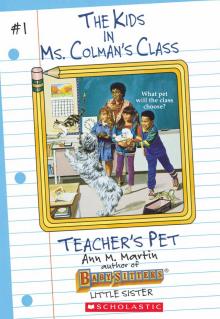 Teacher's Pet
Teacher's Pet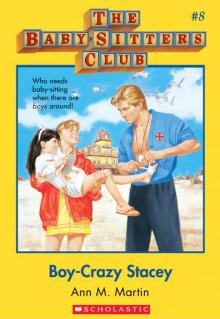 Boy-Crazy Stacey
Boy-Crazy Stacey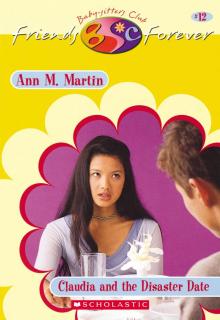 Claudia and the Disaster Date
Claudia and the Disaster Date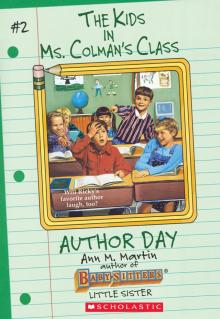 Author Day
Author Day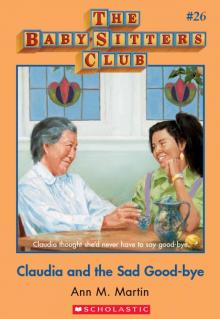 Claudia and the Sad Good-Bye
Claudia and the Sad Good-Bye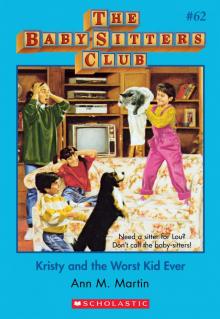 Kristy and the Worst Kid Ever
Kristy and the Worst Kid Ever Yours Turly, Shirley
Yours Turly, Shirley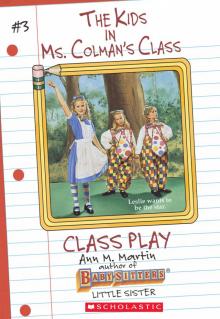 Class Play
Class Play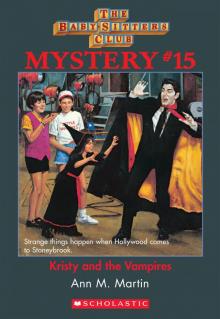 Kristy and the Vampires
Kristy and the Vampires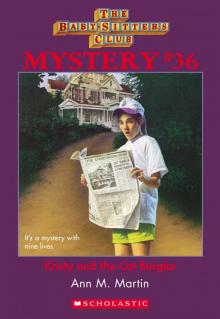 Kristy and the Cat Burglar
Kristy and the Cat Burglar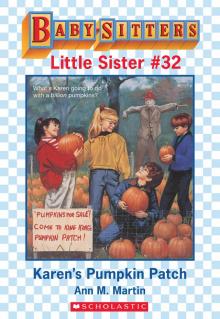 Karen's Pumpkin Patch
Karen's Pumpkin Patch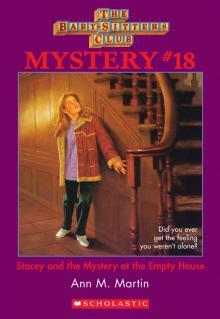 Stacey and the Mystery at the Empty House
Stacey and the Mystery at the Empty House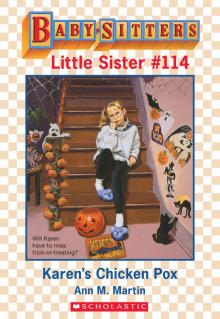 Karen's Chicken Pox
Karen's Chicken Pox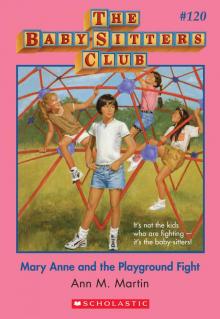 Mary Anne and the Playground Fight
Mary Anne and the Playground Fight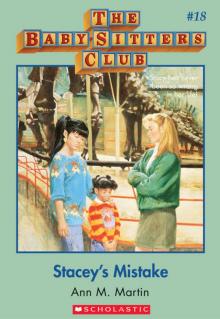 Stacey's Mistake
Stacey's Mistake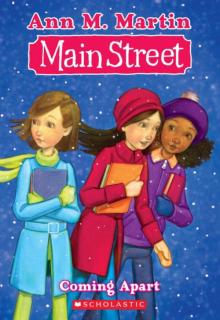 Coming Apart
Coming Apart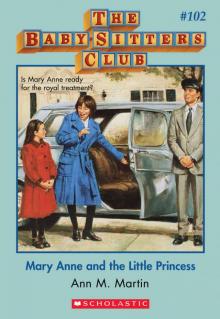 Mary Anne and the Little Princess
Mary Anne and the Little Princess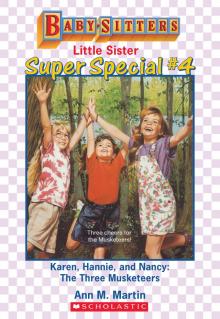 Karen, Hannie and Nancy: The Three Musketeers
Karen, Hannie and Nancy: The Three Musketeers 'Tis the Season
'Tis the Season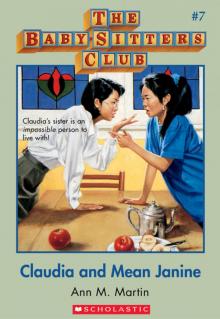 Claudia and Mean Janine
Claudia and Mean Janine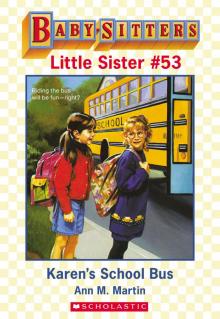 Karen's School Bus
Karen's School Bus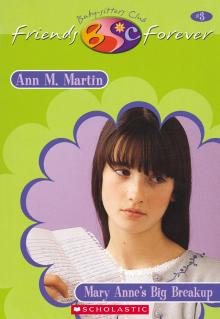 Mary Anne's Big Breakup
Mary Anne's Big Breakup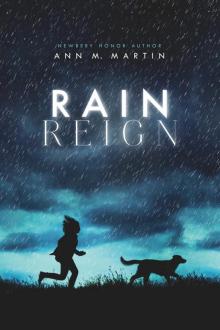 Rain Reign
Rain Reign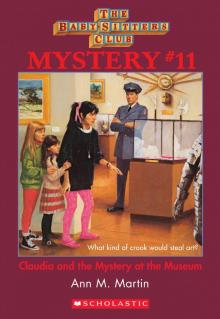 Claudia and the Mystery at the Museum
Claudia and the Mystery at the Museum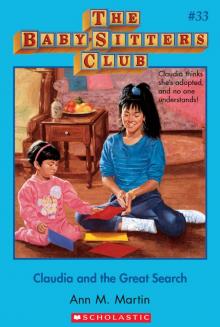 Claudia and the Great Search
Claudia and the Great Search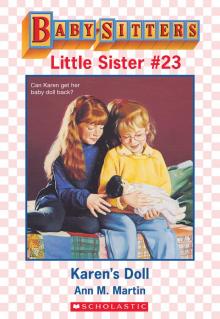 Karen's Doll
Karen's Doll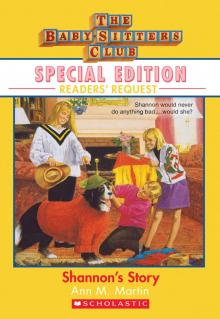 Shannon's Story
Shannon's Story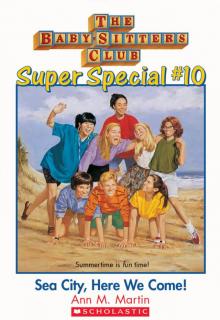 Sea City, Here We Come!
Sea City, Here We Come!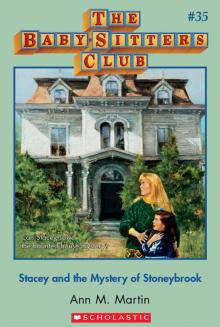 Stacey and the Mystery of Stoneybrook
Stacey and the Mystery of Stoneybrook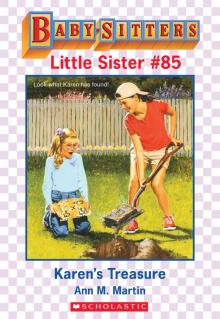 Karen's Treasure
Karen's Treasure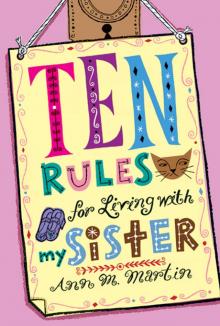 Ten Rules for Living With My Sister
Ten Rules for Living With My Sister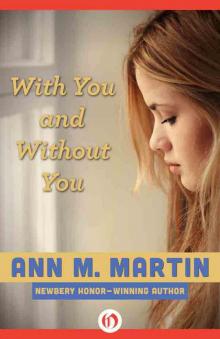 With You and Without You
With You and Without You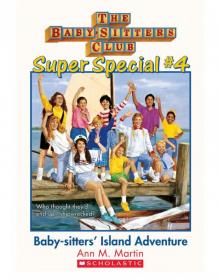 Baby-Sitters' Island Adventure
Baby-Sitters' Island Adventure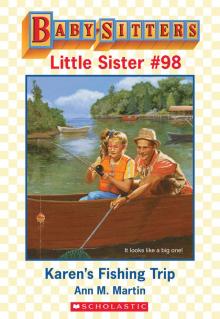 Karen's Fishing Trip
Karen's Fishing Trip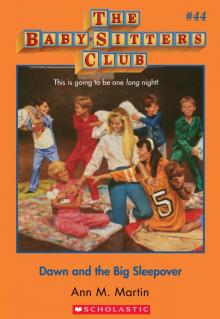 Dawn and the Big Sleepover
Dawn and the Big Sleepover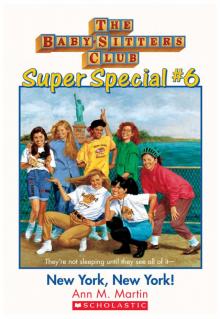 New York, New York!
New York, New York!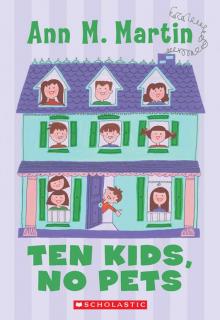 Ten Kids, No Pets
Ten Kids, No Pets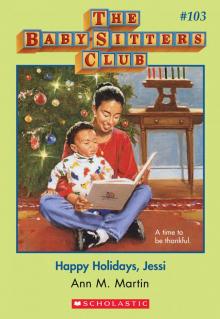 Happy Holidays, Jessi
Happy Holidays, Jessi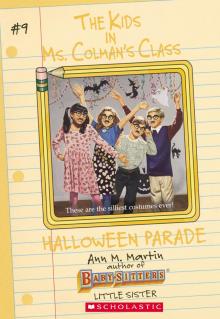 Halloween Parade
Halloween Parade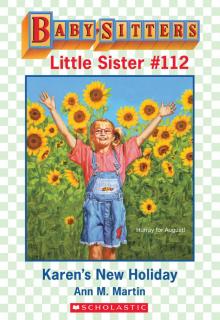 Karen's New Holiday
Karen's New Holiday Kristy Power!
Kristy Power!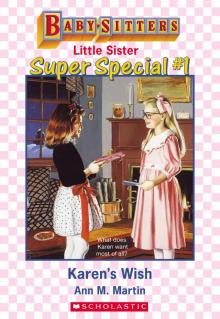 Karen's Wish
Karen's Wish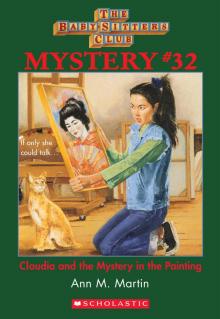 Claudia and the Mystery in the Painting
Claudia and the Mystery in the Painting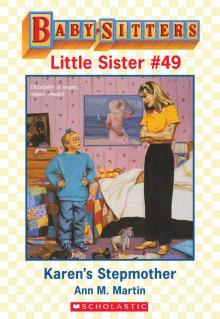 Karen's Stepmother
Karen's Stepmother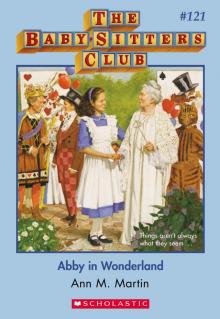 Abby in Wonderland
Abby in Wonderland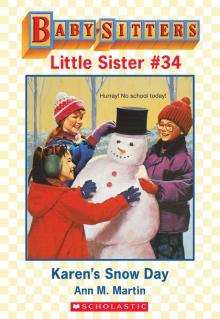 Karen's Snow Day
Karen's Snow Day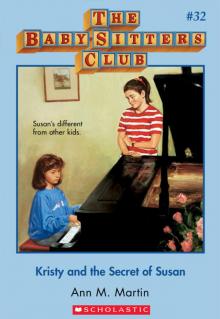 Kristy and the Secret of Susan
Kristy and the Secret of Susan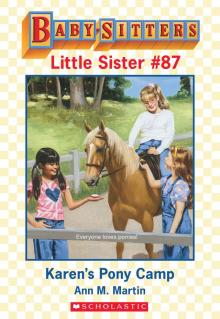 Karen's Pony Camp
Karen's Pony Camp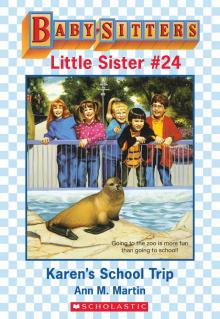 Karen's School Trip
Karen's School Trip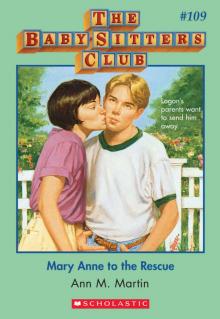 Mary Anne to the Rescue
Mary Anne to the Rescue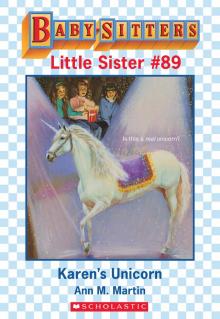 Karen's Unicorn
Karen's Unicorn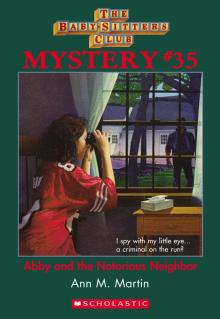 Abby and the Notorious Neighbor
Abby and the Notorious Neighbor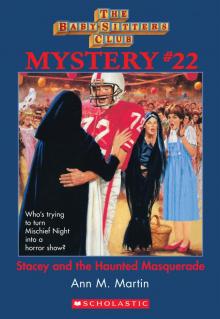 Stacey and the Haunted Masquerade
Stacey and the Haunted Masquerade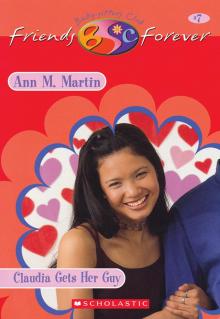 Claudia Gets Her Guy
Claudia Gets Her Guy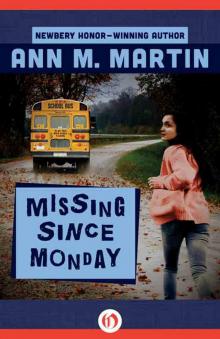 Missing Since Monday
Missing Since Monday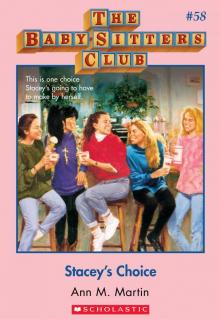 Stacey's Choice
Stacey's Choice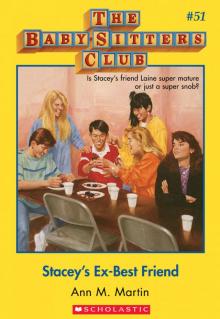 Stacey's Ex-Best Friend
Stacey's Ex-Best Friend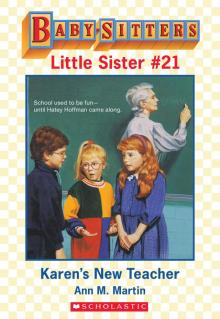 Karen's New Teacher
Karen's New Teacher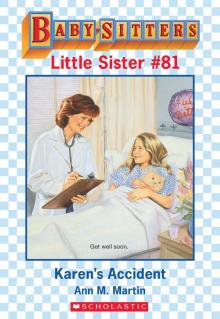 Karen's Accident
Karen's Accident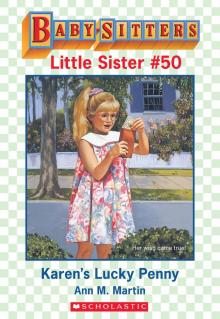 Karen's Lucky Penny
Karen's Lucky Penny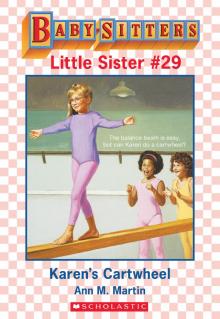 Karen's Cartwheel
Karen's Cartwheel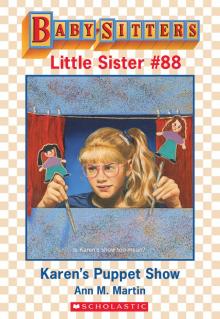 Karen's Puppet Show
Karen's Puppet Show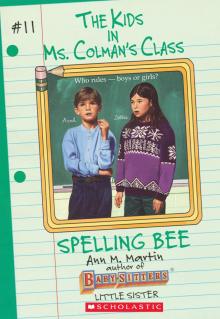 Spelling Bee
Spelling Bee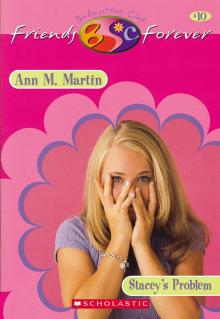 Stacey's Problem
Stacey's Problem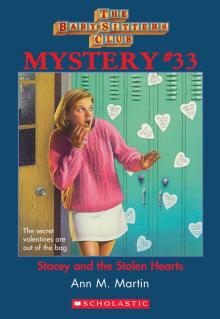 Stacey and the Stolen Hearts
Stacey and the Stolen Hearts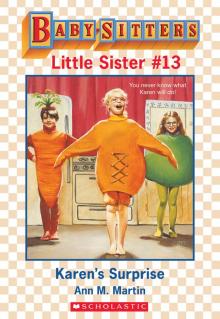 Karen's Surprise
Karen's Surprise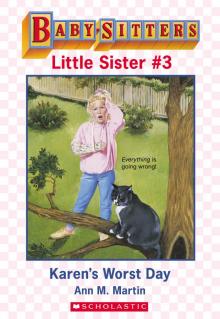 Karen's Worst Day
Karen's Worst Day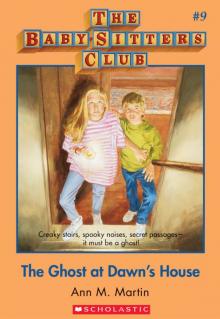 The Ghost at Dawn's House
The Ghost at Dawn's House Karen's Big Sister
Karen's Big Sister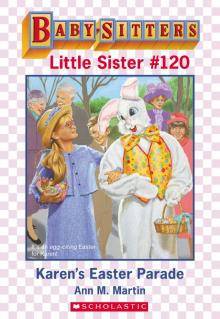 Karen's Easter Parade
Karen's Easter Parade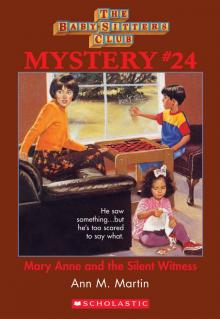 Mary Anne and the Silent Witness
Mary Anne and the Silent Witness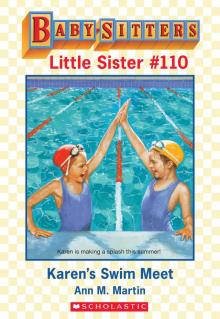 Karen's Swim Meet
Karen's Swim Meet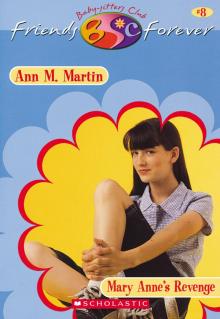 Mary Anne's Revenge
Mary Anne's Revenge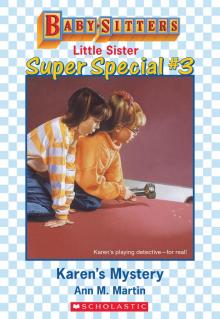 Karen's Mystery
Karen's Mystery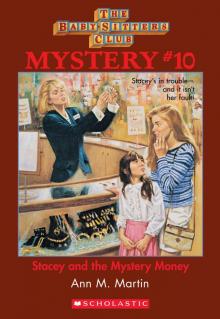 Stacey and the Mystery Money
Stacey and the Mystery Money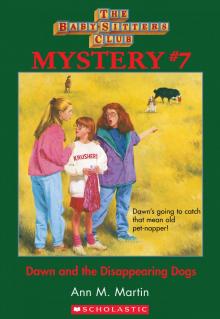 Dawn and the Disappearing Dogs
Dawn and the Disappearing Dogs Karen's Christmas Tree
Karen's Christmas Tree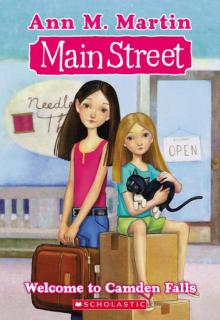 Welcome to Camden Falls
Welcome to Camden Falls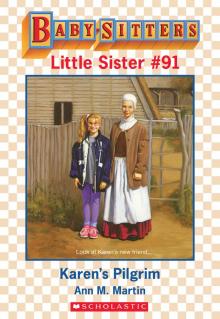 Karen's Pilgrim
Karen's Pilgrim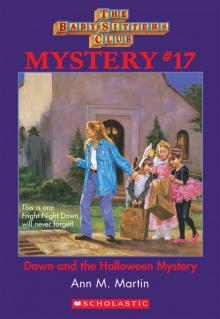 Dawn and the Halloween Mystery
Dawn and the Halloween Mystery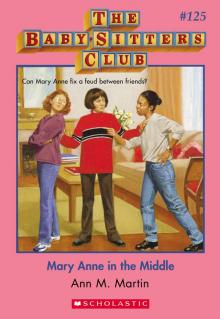 Mary Anne in the Middle
Mary Anne in the Middle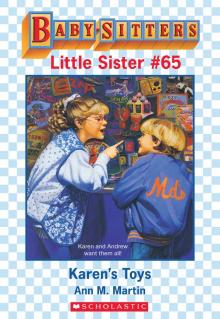 Karen's Toys
Karen's Toys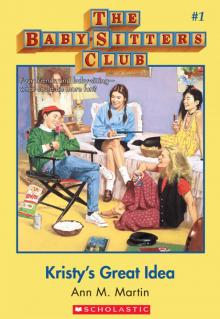 Kristy's Great Idea
Kristy's Great Idea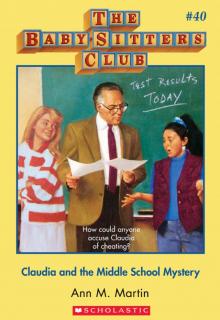 Claudia and the Middle School Mystery
Claudia and the Middle School Mystery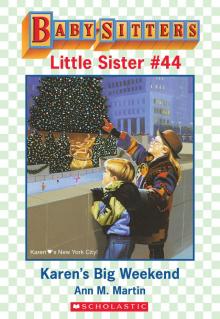 Karen's Big Weekend
Karen's Big Weekend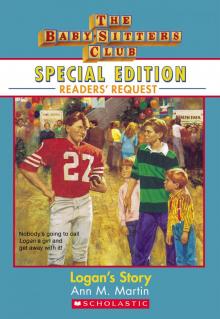 Logan's Story
Logan's Story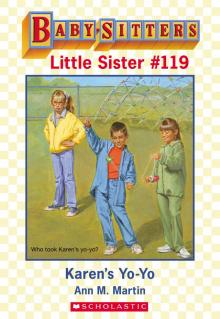 Karen's Yo-Yo
Karen's Yo-Yo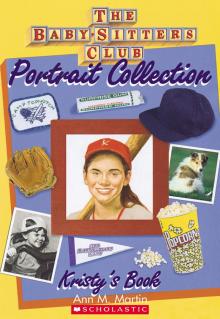 Kristy's Book
Kristy's Book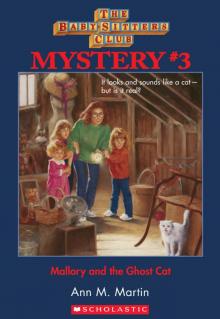 Mallory and the Ghost Cat
Mallory and the Ghost Cat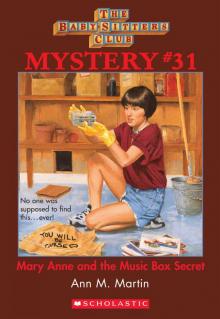 Mary Anne and the Music
Mary Anne and the Music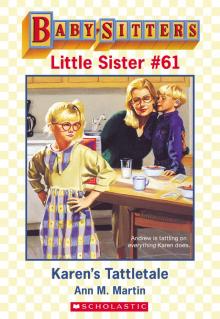 Karen's Tattletale
Karen's Tattletale Karen's County Fair
Karen's County Fair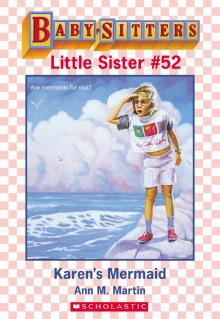 Karen's Mermaid
Karen's Mermaid Snowbound
Snowbound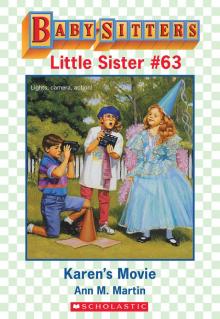 Karen's Movie
Karen's Movie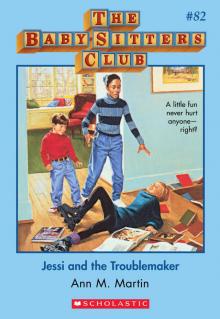 Jessi and the Troublemaker
Jessi and the Troublemaker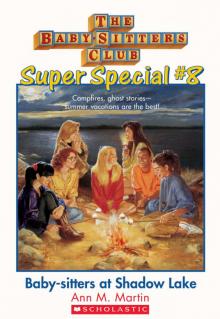 Baby-Sitters at Shadow Lake
Baby-Sitters at Shadow Lake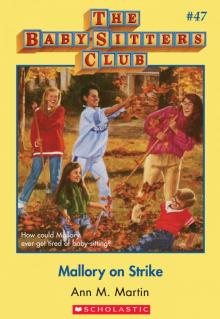 Mallory on Strike
Mallory on Strike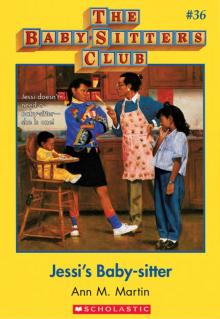 Jessi's Baby-Sitter
Jessi's Baby-Sitter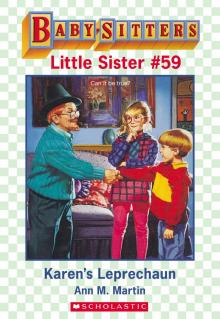 Karen's Leprechaun
Karen's Leprechaun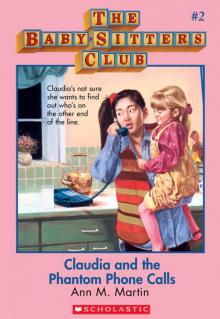 Claudia and the Phantom Phone Calls
Claudia and the Phantom Phone Calls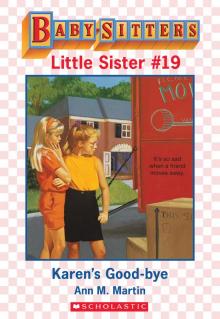 Karen's Good-Bye
Karen's Good-Bye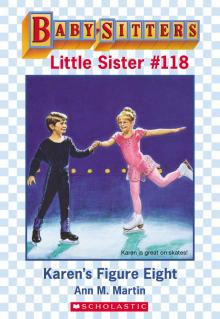 Karen's Figure Eight
Karen's Figure Eight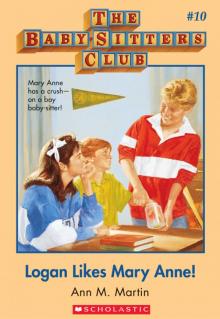 Logan Likes Mary Anne!
Logan Likes Mary Anne!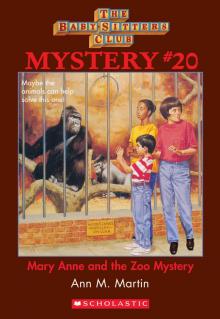 Mary Anne and the Zoo Mystery
Mary Anne and the Zoo Mystery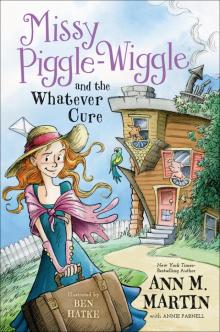 Missy Piggle-Wiggle and the Whatever Cure
Missy Piggle-Wiggle and the Whatever Cure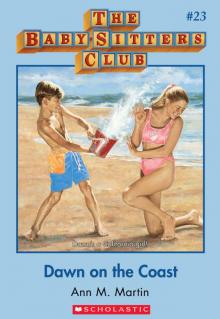 Dawn on the Coast
Dawn on the Coast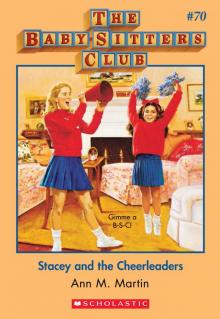 Stacey and the Cheerleaders
Stacey and the Cheerleaders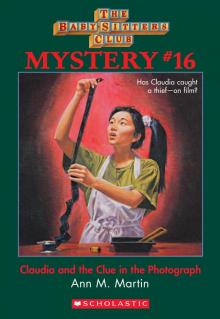 Claudia and the Clue in the Photograph
Claudia and the Clue in the Photograph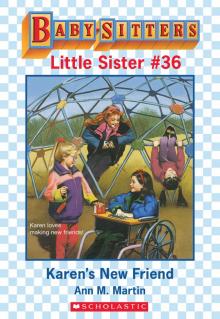 Karen's New Friend
Karen's New Friend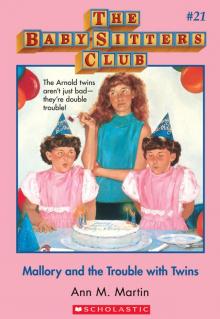 Mallory and the Trouble With Twins
Mallory and the Trouble With Twins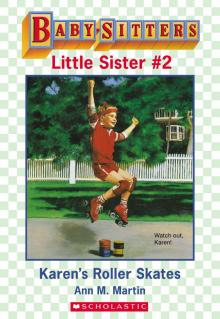 Karen's Roller Skates
Karen's Roller Skates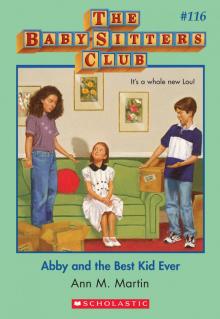 Abby and the Best Kid Ever
Abby and the Best Kid Ever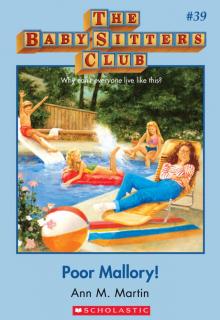 Poor Mallory!
Poor Mallory!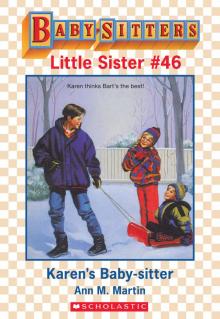 Karen's Witch
Karen's Witch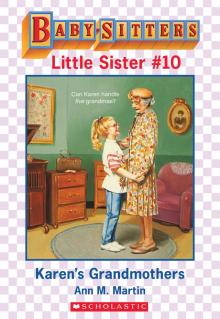 Karen's Grandmothers
Karen's Grandmothers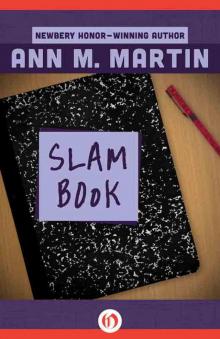 Slam Book
Slam Book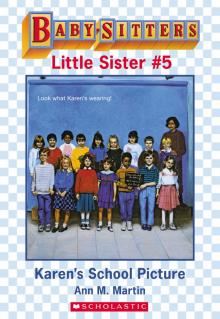 Karen's School Picture
Karen's School Picture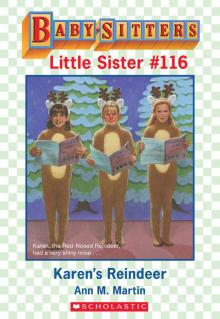 Karen's Reindeer
Karen's Reindeer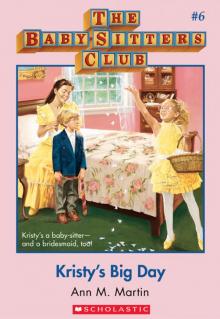 Kristy's Big Day
Kristy's Big Day The Long Way Home
The Long Way Home Karen's Sleigh Ride
Karen's Sleigh Ride On Christmas Eve
On Christmas Eve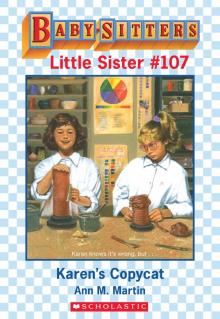 Karen's Copycat
Karen's Copycat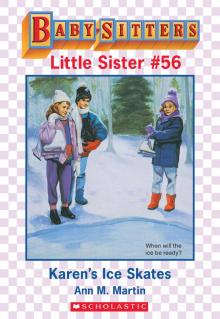 Karen's Ice Skates
Karen's Ice Skates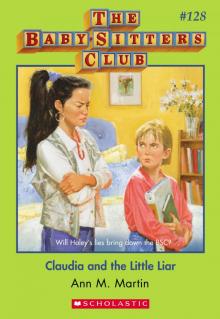 Claudia and the Little Liar
Claudia and the Little Liar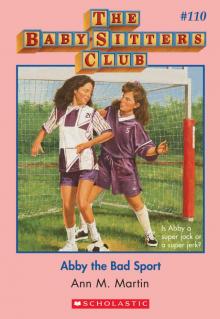 Abby the Bad Sport
Abby the Bad Sport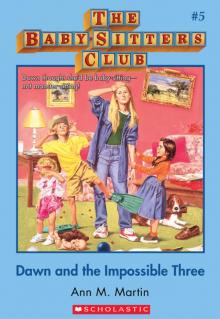 The Baby-Sitters Club #5: Dawn and the Impossible Three
The Baby-Sitters Club #5: Dawn and the Impossible Three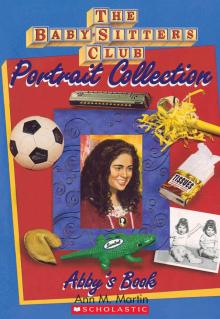 Abby's Book
Abby's Book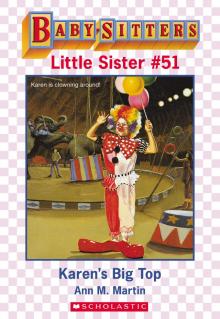 Karen's Big Top
Karen's Big Top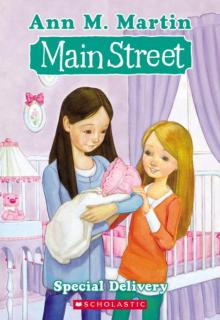 Main Street #8: Special Delivery
Main Street #8: Special Delivery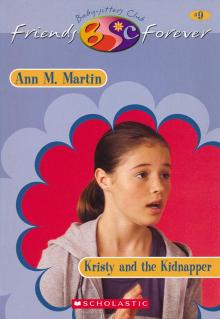 Kristy and the Kidnapper
Kristy and the Kidnapper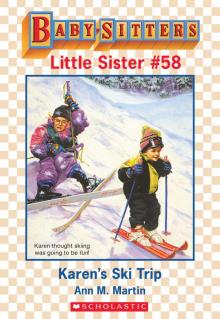 Karen's Ski Trip
Karen's Ski Trip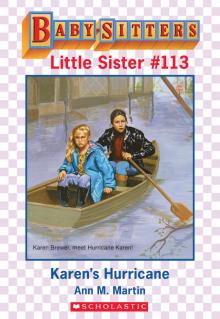 Karen's Hurricane
Karen's Hurricane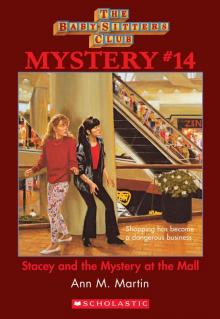 Stacey and the Mystery at the Mall
Stacey and the Mystery at the Mall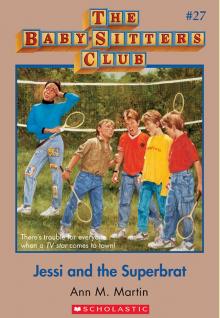 Jessi and the Superbrat
Jessi and the Superbrat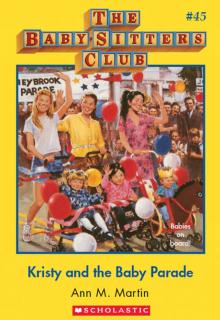 Kristy and the Baby Parade
Kristy and the Baby Parade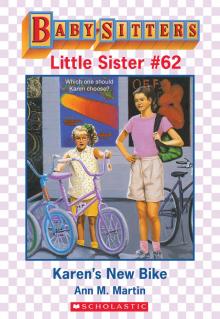 Karen's New Bike
Karen's New Bike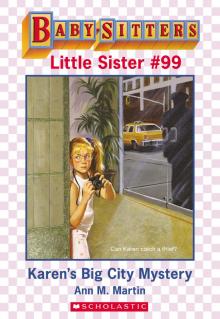 Karen's Big City Mystery
Karen's Big City Mystery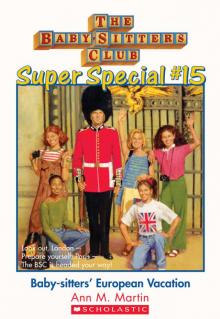 Baby-Sitters' European Vacation
Baby-Sitters' European Vacation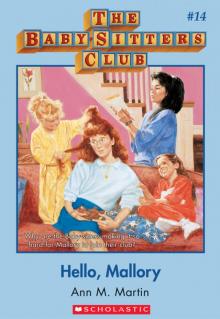 Hello, Mallory
Hello, Mallory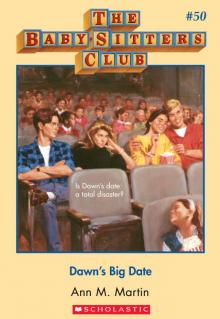 Dawn's Big Date
Dawn's Big Date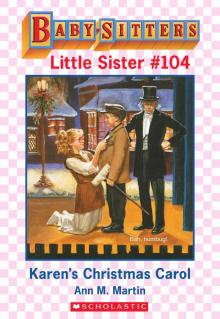 Karen's Christmas Carol
Karen's Christmas Carol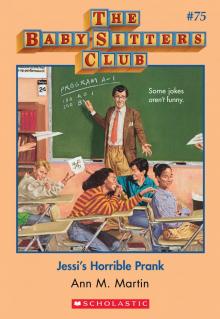 Jessi's Horrible Prank
Jessi's Horrible Prank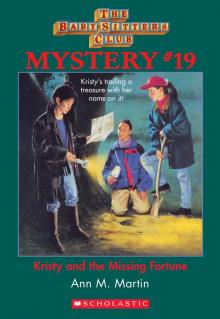 Kristy and the Missing Fortune
Kristy and the Missing Fortune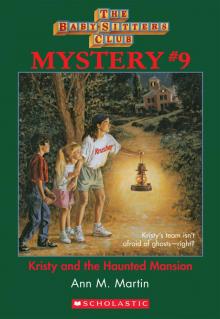 Kristy and the Haunted Mansion
Kristy and the Haunted Mansion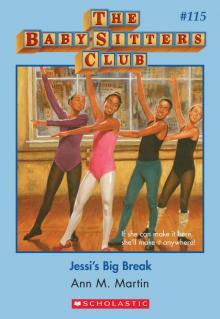 Jessi's Big Break
Jessi's Big Break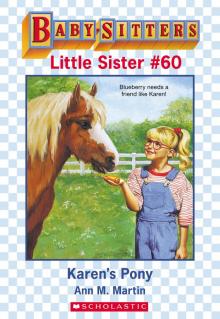 Karen's Pony
Karen's Pony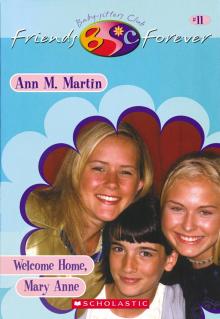 Welcome Home, Mary Anne
Welcome Home, Mary Anne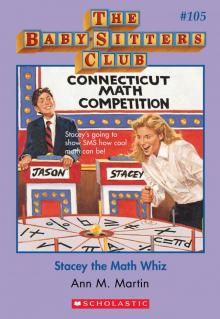 Stacey the Math Whiz
Stacey the Math Whiz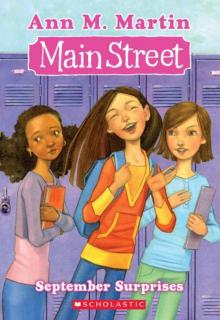 September Surprises
September Surprises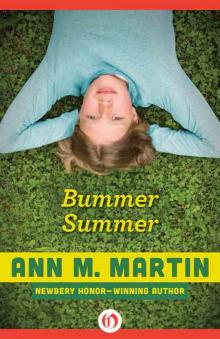 Bummer Summer
Bummer Summer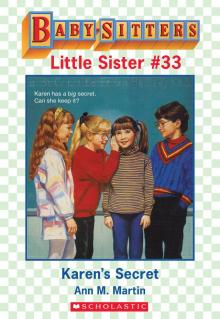 Karen's Secret
Karen's Secret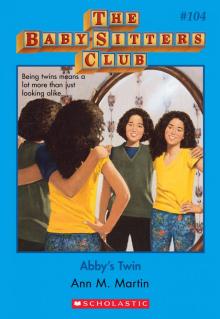 Abby's Twin
Abby's Twin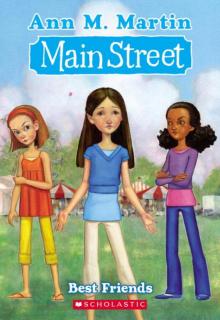 Main Street #4: Best Friends
Main Street #4: Best Friends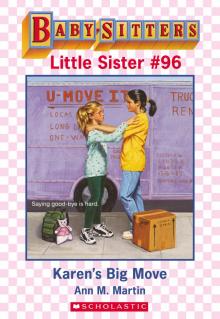 Karen's Big Move
Karen's Big Move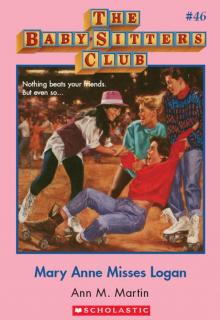 Mary Anne Misses Logan
Mary Anne Misses Logan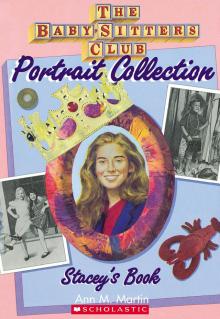 Stacey's Book
Stacey's Book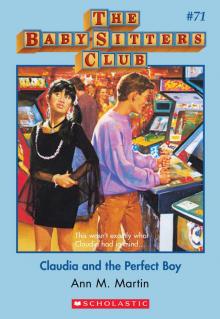 Claudia and the Perfect Boy
Claudia and the Perfect Boy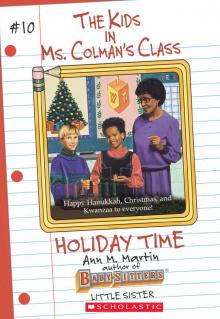 Holiday Time
Holiday Time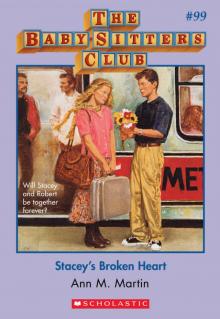 Stacey's Broken Heart
Stacey's Broken Heart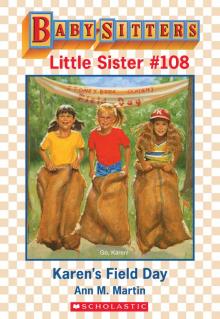 Karen's Field Day
Karen's Field Day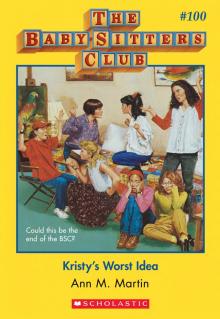 Kristy's Worst Idea
Kristy's Worst Idea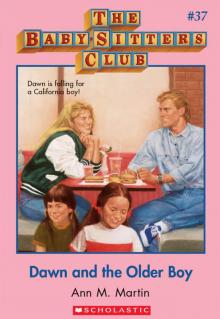 Dawn and the Older Boy
Dawn and the Older Boy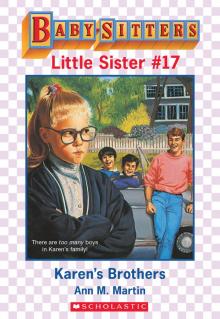 Karen's Brothers
Karen's Brothers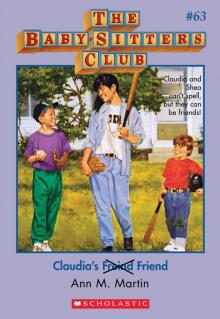 Claudia's Friend
Claudia's Friend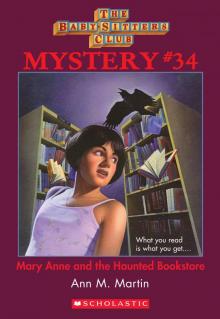 Mary Anne and the Haunted Bookstore
Mary Anne and the Haunted Bookstore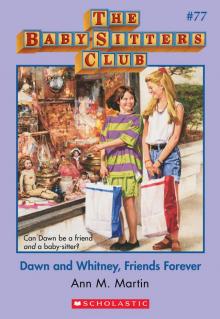 Dawn and Whitney, Friends Forever
Dawn and Whitney, Friends Forever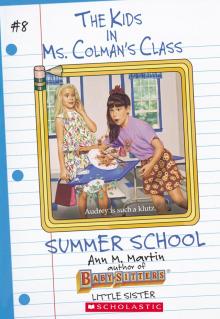 Summer School
Summer School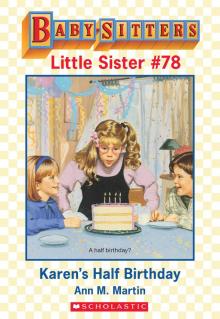 Karen's Birthday
Karen's Birthday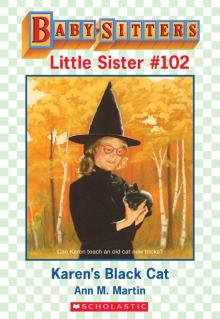 Karen's Black Cat
Karen's Black Cat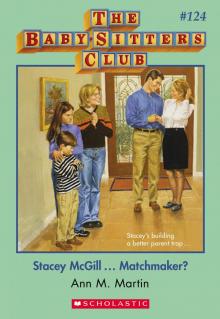 Stacey McGill... Matchmaker?
Stacey McGill... Matchmaker?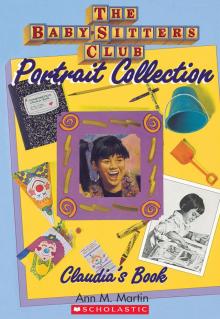 Claudia's Book
Claudia's Book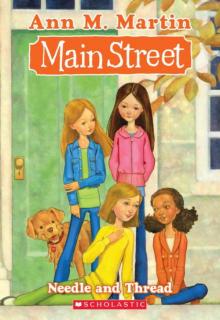 Main Street #2: Needle and Thread
Main Street #2: Needle and Thread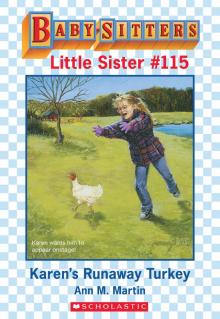 Karen's Runaway Turkey
Karen's Runaway Turkey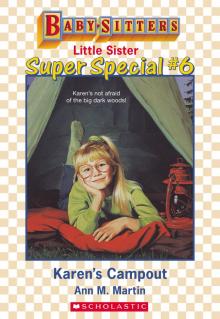 Karen's Campout
Karen's Campout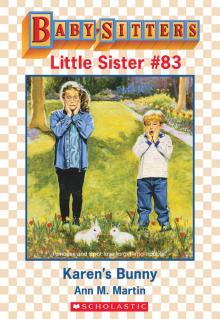 Karen's Bunny
Karen's Bunny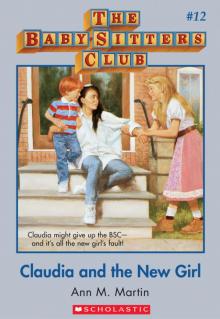 Claudia and the New Girl
Claudia and the New Girl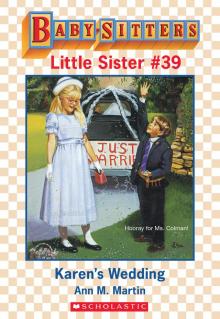 Karen's Wedding
Karen's Wedding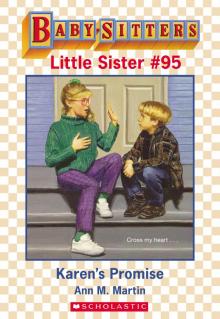 Karen's Promise
Karen's Promise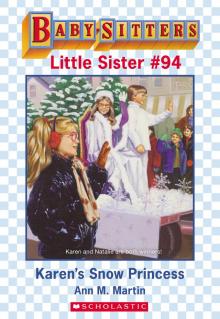 Karen's Snow Princess
Karen's Snow Princess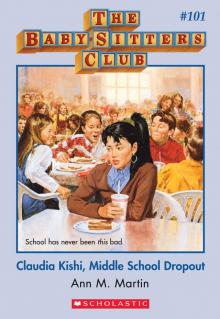 Claudia Kishi, Middle School Dropout
Claudia Kishi, Middle School Dropout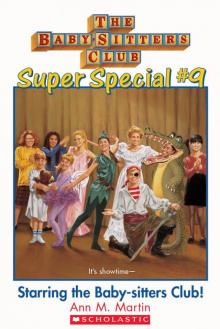 Starring the Baby-Sitters Club!
Starring the Baby-Sitters Club!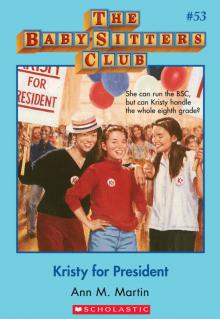 Kristy for President
Kristy for President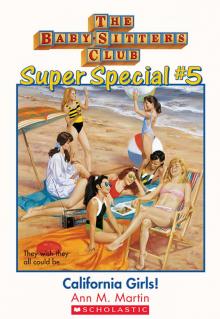 California Girls!
California Girls!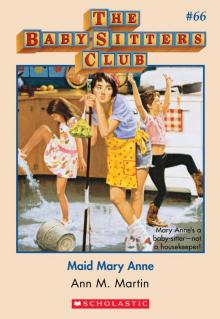 Maid Mary Anne
Maid Mary Anne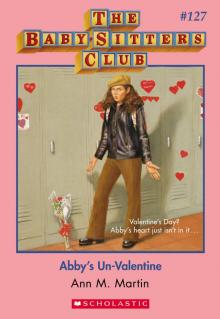 Abby's Un-Valentine
Abby's Un-Valentine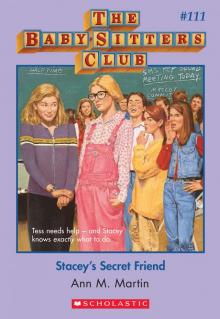 Stacey's Secret Friend
Stacey's Secret Friend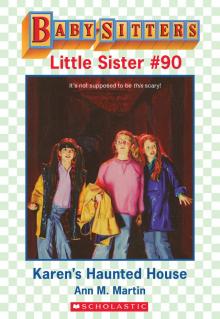 Karen's Haunted House
Karen's Haunted House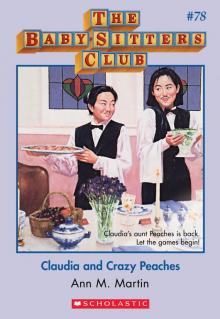 Claudia and Crazy Peaches
Claudia and Crazy Peaches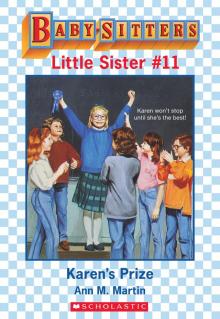 Karen's Prize
Karen's Prize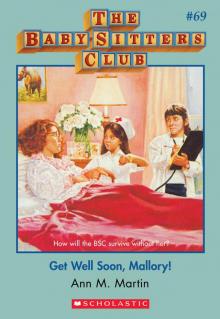 Get Well Soon, Mallory!
Get Well Soon, Mallory!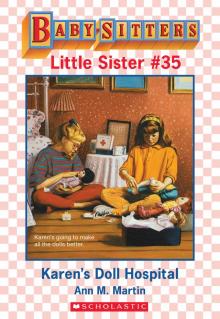 Karen's Doll Hospital
Karen's Doll Hospital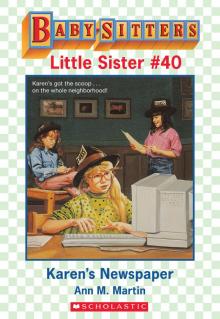 Karen's Newspaper
Karen's Newspaper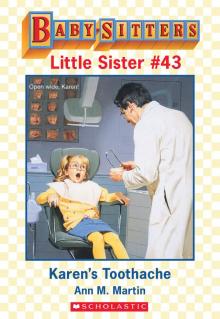 Karen's Toothache
Karen's Toothache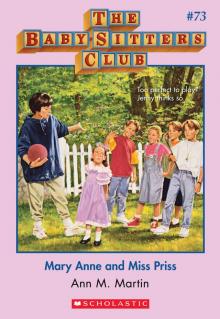 Mary Anne and Miss Priss
Mary Anne and Miss Priss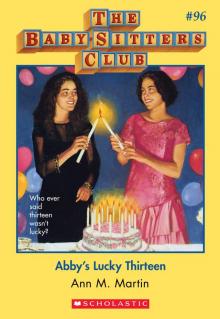 Abby's Lucky Thirteen
Abby's Lucky Thirteen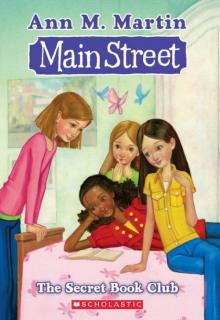 The Secret Book Club
The Secret Book Club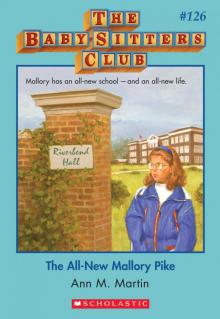 The All-New Mallory Pike
The All-New Mallory Pike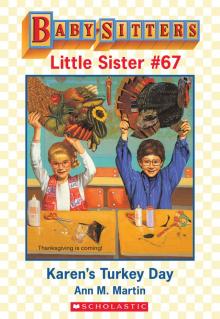 Karen's Turkey Day
Karen's Turkey Day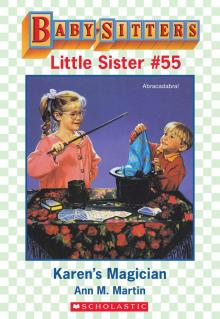 Karen's Magician
Karen's Magician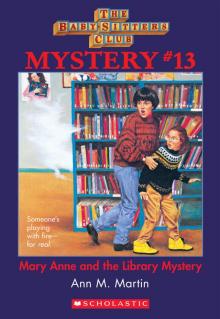 Mary Anne and the Library Mystery
Mary Anne and the Library Mystery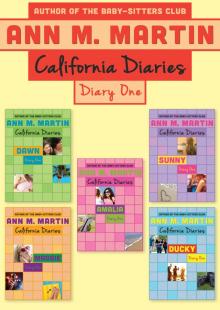 Diary One: Dawn, Sunny, Maggie, Amalia, and Ducky
Diary One: Dawn, Sunny, Maggie, Amalia, and Ducky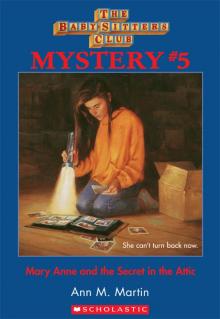 Mary Anne and the Secret in the Attic
Mary Anne and the Secret in the Attic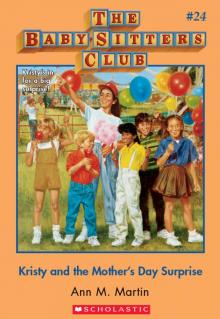 Kristy and the Mother's Day Surprise
Kristy and the Mother's Day Surprise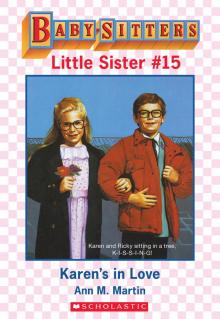 Karen's in Love
Karen's in Love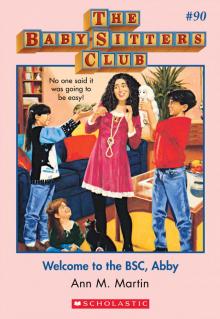 Welcome to the BSC, Abby
Welcome to the BSC, Abby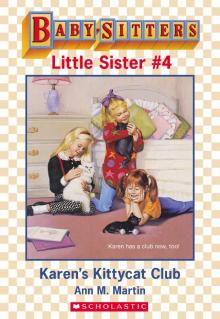 Karen's Kittycat Club
Karen's Kittycat Club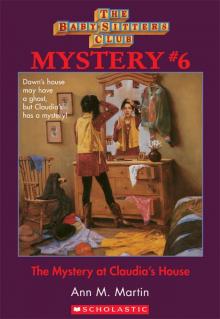 The Mystery at Claudia's House
The Mystery at Claudia's House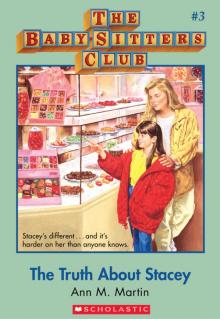 The Truth About Stacey
The Truth About Stacey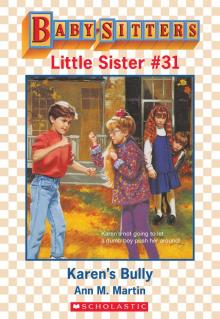 Karen's Bully
Karen's Bully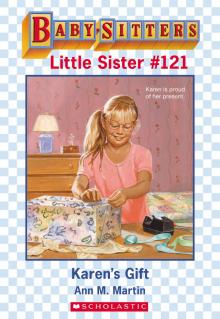 Karen's Gift
Karen's Gift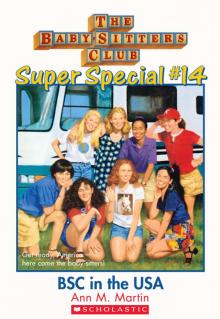 BSC in the USA
BSC in the USA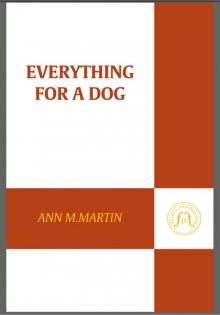 Everything for a Dog
Everything for a Dog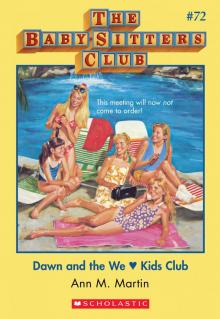 Dawn and the We Love Kids Club
Dawn and the We Love Kids Club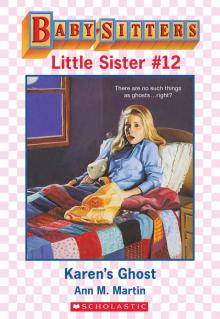 Karen's Ghost
Karen's Ghost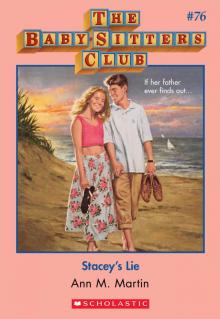 Stacey's Lie
Stacey's Lie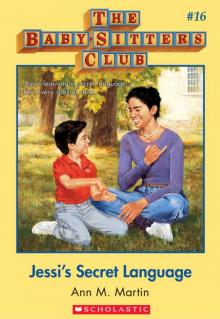 Jessi's Secret Language
Jessi's Secret Language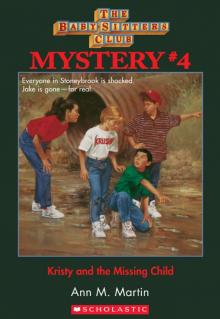 Kristy and the Missing Child
Kristy and the Missing Child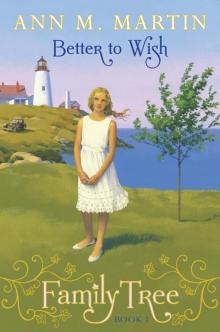 Better to Wish
Better to Wish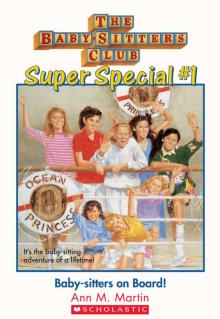 Baby-Sitters on Board!
Baby-Sitters on Board!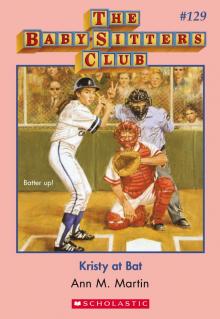 Kristy at Bat
Kristy at Bat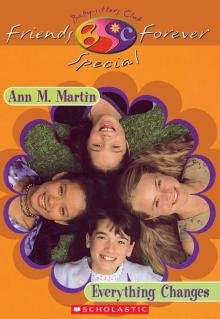 Everything Changes
Everything Changes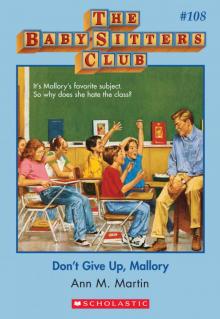 Don't Give Up, Mallory
Don't Give Up, Mallory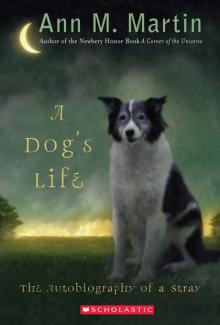 A Dog's Life: The Autobiography of a Stray
A Dog's Life: The Autobiography of a Stray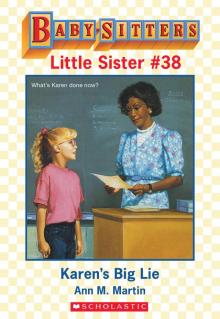 Karen's Big Lie
Karen's Big Lie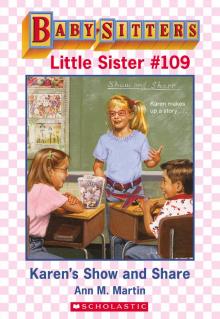 Karen's Show and Share
Karen's Show and Share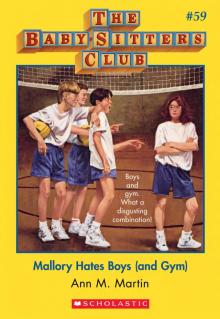 Mallory Hates Boys (and Gym)
Mallory Hates Boys (and Gym)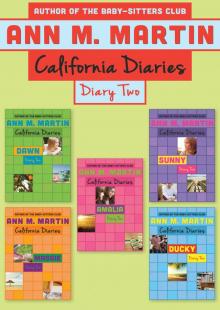 Diary Two: Dawn, Sunny, Maggie, Amalia, and Ducky
Diary Two: Dawn, Sunny, Maggie, Amalia, and Ducky Karen's Pen Pal
Karen's Pen Pal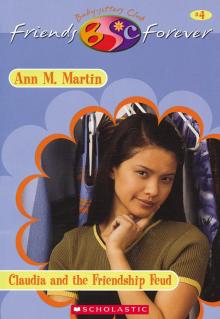 Claudia and the Friendship Feud
Claudia and the Friendship Feud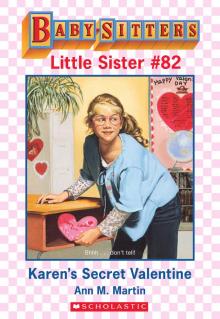 Karen's Secret Valentine
Karen's Secret Valentine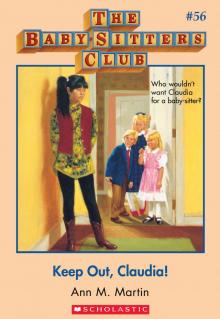 Keep Out, Claudia!
Keep Out, Claudia!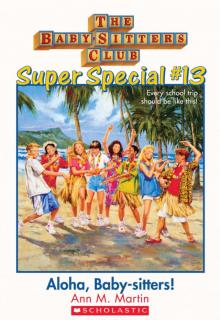 Aloha, Baby-Sitters!
Aloha, Baby-Sitters!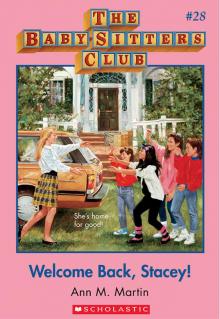 Welcome Back, Stacey
Welcome Back, Stacey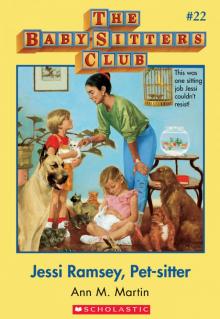 Jessi Ramsey, Pet-Sitter
Jessi Ramsey, Pet-Sitter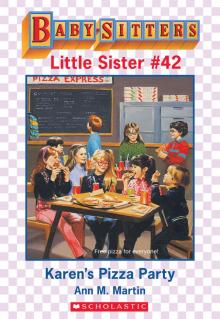 Karen's Pizza Party
Karen's Pizza Party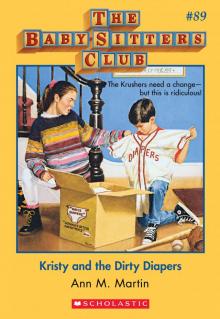 Kristy and the Dirty Diapers
Kristy and the Dirty Diapers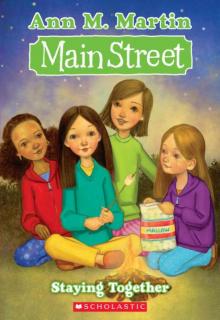 Staying Together
Staying Together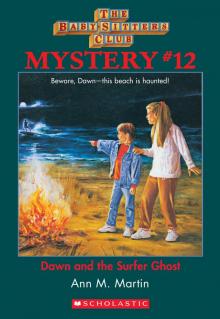 Dawn and the Surfer Ghost
Dawn and the Surfer Ghost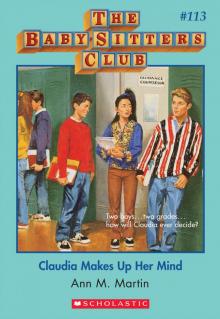 Claudia Makes Up Her Mind
Claudia Makes Up Her Mind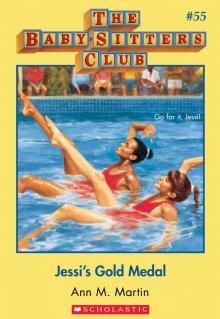 Jessi's Gold Medal
Jessi's Gold Medal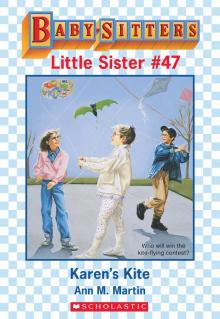 Karen's Kite
Karen's Kite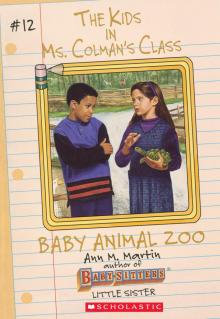 Baby Animal Zoo
Baby Animal Zoo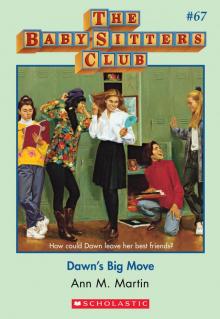 Dawn's Big Move
Dawn's Big Move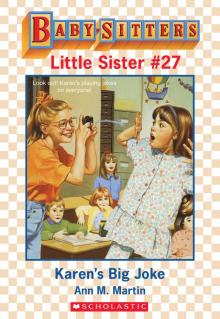 Karen's Big Joke
Karen's Big Joke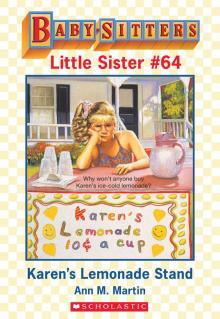 Karen's Lemonade Stand
Karen's Lemonade Stand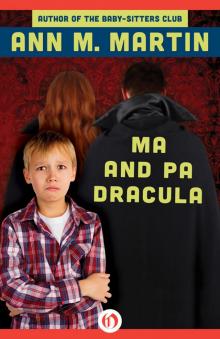 Ma and Pa Dracula
Ma and Pa Dracula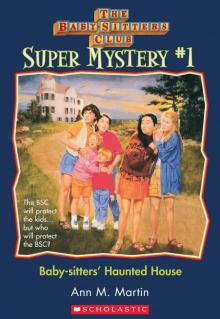 Baby-Sitters' Haunted House
Baby-Sitters' Haunted House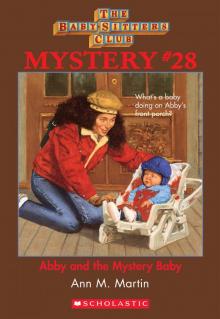 Abby and the Mystery Baby
Abby and the Mystery Baby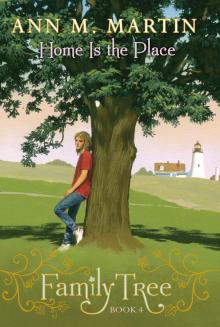 Home Is the Place
Home Is the Place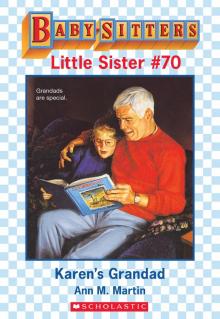 Karen's Grandad
Karen's Grandad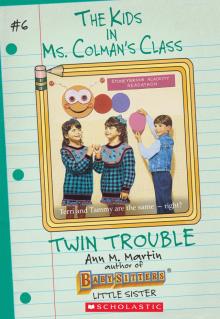 Twin Trouble
Twin Trouble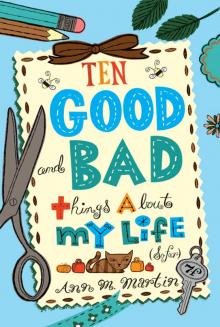 Ten Good and Bad Things About My Life (So Far)
Ten Good and Bad Things About My Life (So Far)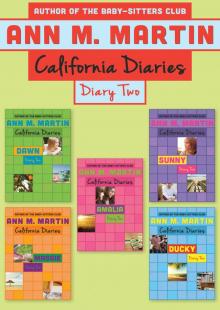 Diary Two
Diary Two Baby-Sitters Club 027
Baby-Sitters Club 027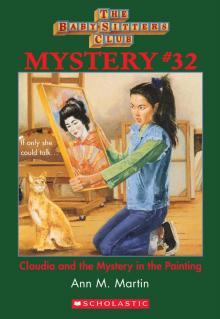 Claudia and the Mystery Painting
Claudia and the Mystery Painting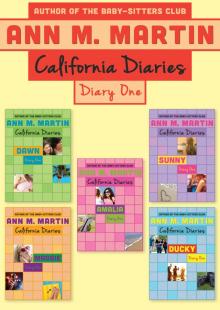 Diary One
Diary One Baby-Sitters Club 037
Baby-Sitters Club 037 Baby-Sitters Club 028
Baby-Sitters Club 028 Baby-Sitters Club 085
Baby-Sitters Club 085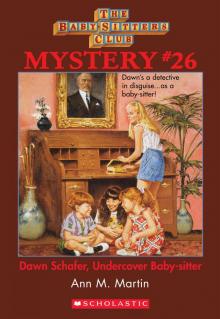 Dawn Schaffer Undercover Baby-Sitter
Dawn Schaffer Undercover Baby-Sitter Jessi's Babysitter
Jessi's Babysitter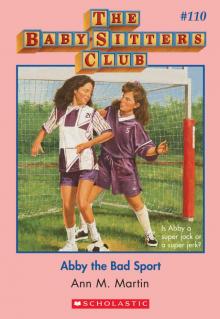 The Baby-Sitters Club #110: Abby the Bad Sport (Baby-Sitters Club, The)
The Baby-Sitters Club #110: Abby the Bad Sport (Baby-Sitters Club, The) Karen's Little Sister
Karen's Little Sister Baby-Sitters Club 058
Baby-Sitters Club 058 Claudia And The Genius On Elm St.
Claudia And The Genius On Elm St.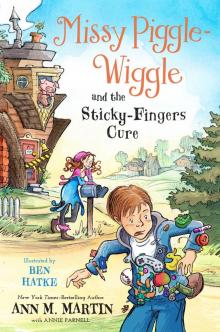 Missy Piggle-Wiggle and the Sticky-Fingers Cure
Missy Piggle-Wiggle and the Sticky-Fingers Cure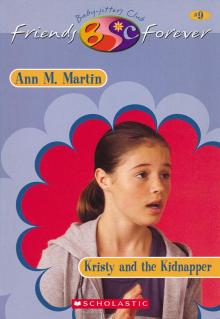 Kristy and Kidnapper
Kristy and Kidnapper Baby-Sitters Club 041
Baby-Sitters Club 041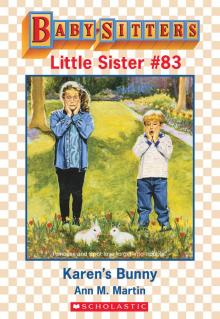 Karen's Bunny Trouble
Karen's Bunny Trouble Baby-Sitters Club 032
Baby-Sitters Club 032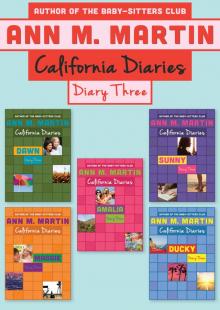 Diary Three
Diary Three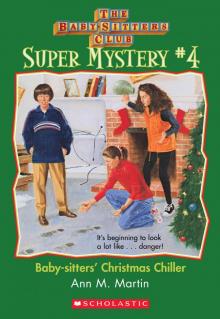 Christmas Chiller
Christmas Chiller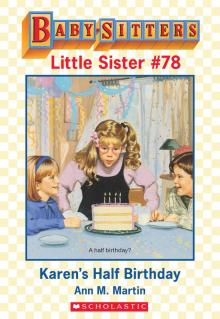 Karen's Half-Birthday
Karen's Half-Birthday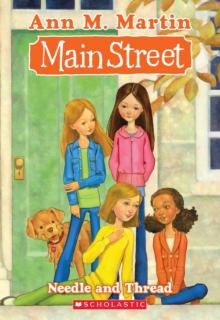 Needle and Thread
Needle and Thread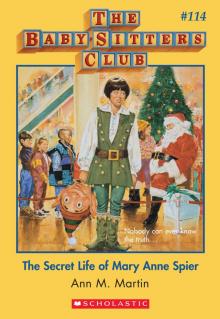 Secret Life of Mary Anne Spier
Secret Life of Mary Anne Spier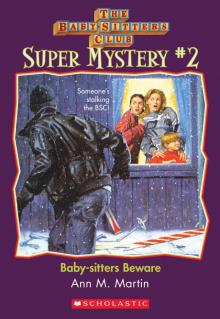 Baby-Sitters Beware
Baby-Sitters Beware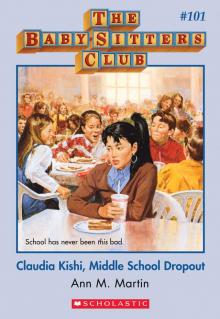 Claudia Kishi, Middle School Drop-Out
Claudia Kishi, Middle School Drop-Out Logan Likes Mary Anne !
Logan Likes Mary Anne ! Baby-Sitters Club 061
Baby-Sitters Club 061 Best Friends
Best Friends Baby-Sitters Club 031
Baby-Sitters Club 031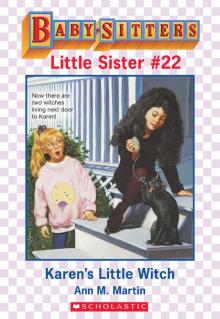 Karen's Little Witch
Karen's Little Witch Jessi Ramsey, Petsitter
Jessi Ramsey, Petsitter Baby-Sitters Club 123
Baby-Sitters Club 123 Baby-Sitters Club 059
Baby-Sitters Club 059 Baby-Sitters Club 033
Baby-Sitters Club 033 Baby-Sitters Club 060
Baby-Sitters Club 060 Baby-Sitters Club 094
Baby-Sitters Club 094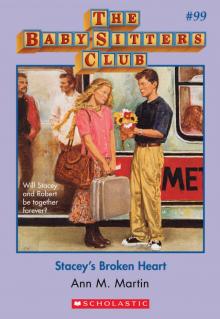 The Baby-Sitters Club #99: Stacey's Broken Heart
The Baby-Sitters Club #99: Stacey's Broken Heart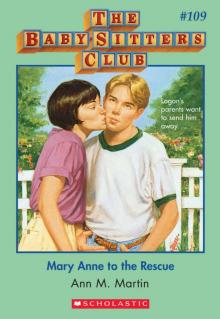 The Baby-Sitters Club #109: Mary Anne to the Rescue (Baby-Sitters Club, The)
The Baby-Sitters Club #109: Mary Anne to the Rescue (Baby-Sitters Club, The) Mystery At Claudia's House
Mystery At Claudia's House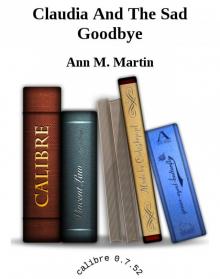 Claudia And The Sad Goodbye
Claudia And The Sad Goodbye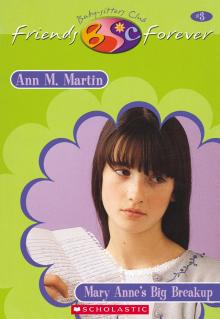 Mary Anne's Big Break-Up
Mary Anne's Big Break-Up Baby-Sitters Club 025
Baby-Sitters Club 025 Baby-Sitters Club 042
Baby-Sitters Club 042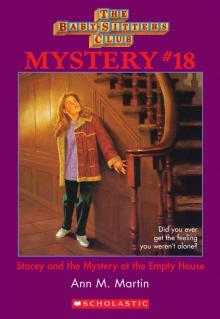 Stacey and the Mystery of the Empty House
Stacey and the Mystery of the Empty House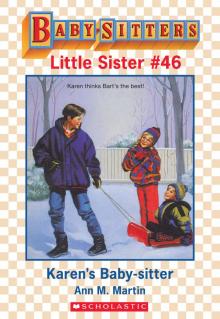 Karen's Baby-Sitter
Karen's Baby-Sitter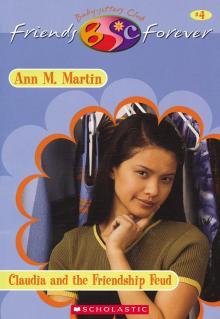 Claudia's Friendship Feud
Claudia's Friendship Feud Baby-Sitters Club 090
Baby-Sitters Club 090 Baby-Sitters Club 021
Baby-Sitters Club 021 Baby-Sitters Club 056
Baby-Sitters Club 056 Baby-Sitters Club 040
Baby-Sitters Club 040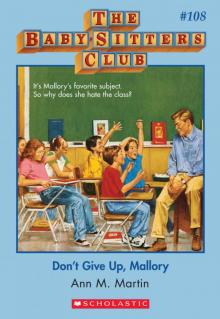 The Baby-Sitters Club #108: Don't Give Up, Mallory (Baby-Sitters Club, The)
The Baby-Sitters Club #108: Don't Give Up, Mallory (Baby-Sitters Club, The)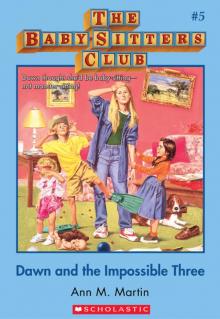 Dawn and the Impossible Three
Dawn and the Impossible Three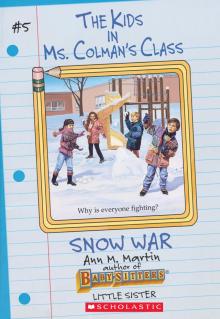 The Snow War
The Snow War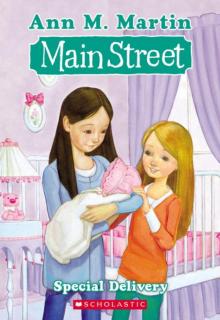 Special Delivery
Special Delivery Baby-Sitters Club 057
Baby-Sitters Club 057 Mary Anne And Too Many Babies
Mary Anne And Too Many Babies Baby-Sitters Club 030
Baby-Sitters Club 030